

Homework Letter to Parents | Email Templates
As a teacher, communicating with parents about the homework expectations for their children is crucial for fostering a successful learning environment. Crafting a homework letter that is both informative and engaging can be a challenging task. That’s why we’ve created a list of homework letter-to-parents templates that you can use to effectively communicate with parents about the assignments, expectations, and goals for their child’s homework. In this article, we’ll go over the key elements of a successful homework letter, and provide you with a customizable template that you can use for your classroom.
The key elements of an effective homework letter to parents include
- A clear introduction that establishes your purpose and goals for the homework,
- A detailed explanation of the assignments, expectations, and grading policies,
- A schedule outlining when homework is due, and a section dedicated to answering frequently asked questions or addressing concerns.
- Additionally, adding information or resources about how parents can support their child’s learning at home and providing resources for additional support can also be helpful.
These elements will help ensure that parents are well-informed about their child’s homework and can effectively support their child’s academic success.
Example of detailed Homework letter to parents
I hope this email finds you, your child, and in good health. I wanted to take the time to talk about the value of homework and how it may aid in your child’s development as we begin the new school year. I’ve designed a template for a homework letter to parents that I’ll be using this year to assist keep you informed about your child’s homework requirements.
The homework template was created to give you succinct, clear information about the homework assignments, goals, and expectations for your child. It will also include a schedule explaining when homework is due, as well as a part devoted to addressing any worries you might have or frequently asked questions.
I’ll explain how the assignment helps your child learn in the introduction, as well as its purpose and goals. You can have a clear grasp of what is expected of your child by reading the thorough explanation section. This section defines the assignments, expectations, and grading guidelines. You may assist your child manage their time by giving them the due dates as per the timetable area.
I have also included some resources to help your child’s learning at home. You can learn how to support your child’s academic success.
I am aware that parents and students alike may find the topic of homework to be difficult, which is why I am providing this homework letter. I hope that this template will make it easier for you to support your child’s learning by having a clear understanding of the homework expectations.
If you have any questions or concerns about the homework letter to parents template, please do not hesitate to reach out to me. I am always available to discuss your child’s academic progress and answer any questions you may have.
Thank you for your continued support in your child’s education.
Homework letter to parents templates
- Dear parent, This is a reminder that it is your child’s responsibility to bring their homework assignments home. We encourage you to make sure your child has their work ready with them each day so we all spend less time on this task and more time on teaching. Missing homework assignments may result in a lower grade for the assignment or even being taken out points from the report card altogether. Please see attached a list of missing homework assignments from your child’s class.
- Dear Parent, We are writing to inform you that we have not received homework from your child for the following subjects [list]. If we do not receive this assignment by 2024, your child will receive a zero grade on all assignments until the missing homework is submitted. We thank you in advance and appreciate your help with this matter.
- Dear parent, we noticed that your child did not hand in his/her homework. We will do our best to ensure your child does not miss out on learning from this lesson. Please ensure that your child brings home their homework next week. Thank you for your time and cooperation.
- Dear Parent, It is important that your child complete their homework on time each night. Please help them by discussing the importance of homework completion and encouraging it to be done every night. Thank you.
- Dear Parent, It has been brought to our attention that your child has been missing homework. We are asking that you remind your child of the importance of homework. Please ensure it is being completed daily, as this greatly helps your child in the classroom. Thank you for your time and cooperation.
- Dear parents, Please see below a list of your child’s missing homework assignments. Please check if there are any questions you may have and then sign the form at the end. We apologize for any inconvenience. Thank You,
- Dear Parent, Your student has not turned in the homework assignment. Please see that they bring it with them tomorrow. If you have any questions or concerns please contact me at [number]. Thank you for your time. Sincerely,
- Dear parent, this is our weekly homework reminder. We would appreciate it if you could check and make sure that your children have their homework completed. That way, they will be capable of focusing on school work instead of struggling to complete missing assignments in class. Thank you for your help.
- Dear Parent, your child has been marked absent for missing homework. Please see the attached document for more information.
- Dear Parent, I am sending this email to notify parents that the assignment [name] was not turned in. I hope that the assignment will be returned soon.
- Dear Parent, We noticed that you missed the lesson titled [name] on Monday. This lesson was designed to help your child develop a better understanding of grammar and sentence structure, which are crucial skills to learn as they grow into successful adults. To access this lesson again and complete the homework assignment please visit the link. If you have any questions or concerns during this process please do not hesitate to contact me.
More Simplestic Templates:
Email to parents about academic concerns
- Positive Email to Parents from Teacher: 15 Example Emails
Related Posts

11 Reminder Email Templates: Polite Reminders

Email To send to brands for collaboration

Farewell Gift for Boss | Ultimate List

The Art of Crafting the Ideal Welcome Email for New Employees

Thursday Inspirational Quotes for work
Join over 100,000 educators for tips & tricks in the Facebook group .
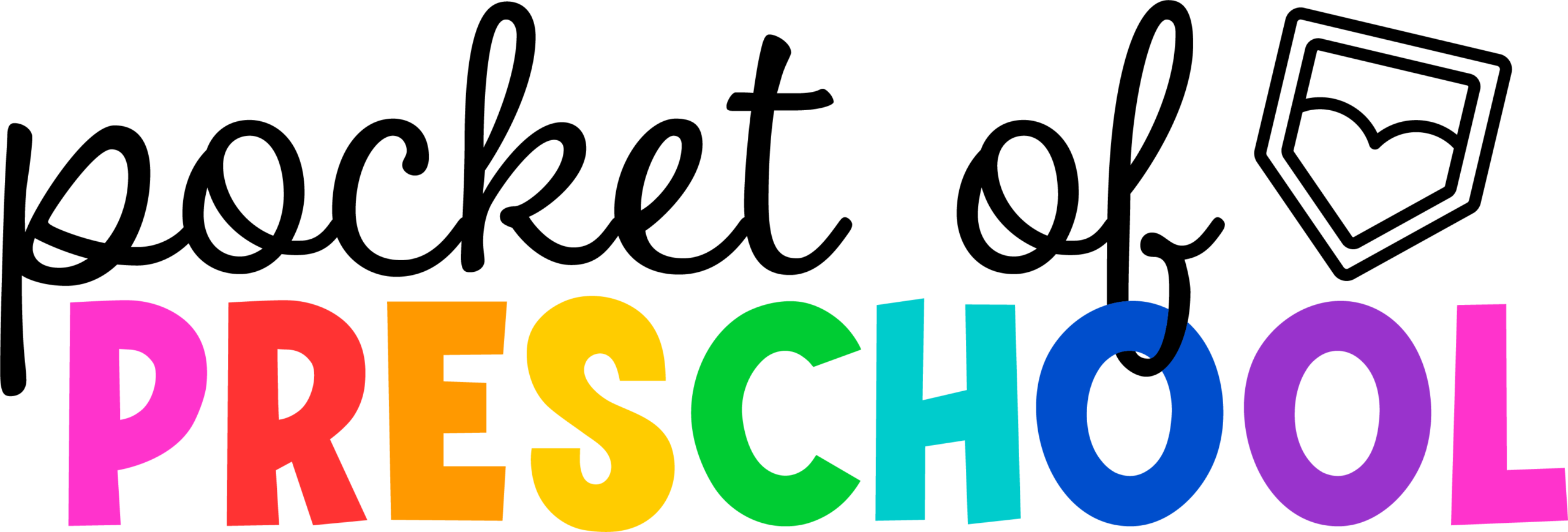
Teaching Tips
Preschool reading logs & parent letter (homework for preschoolers), share this post:.
- Share on Twitter Share on Twitter
- Share on Facebook Share on Facebook
- Share on Pinterest Share on Pinterest
- Share via Email Share via Email
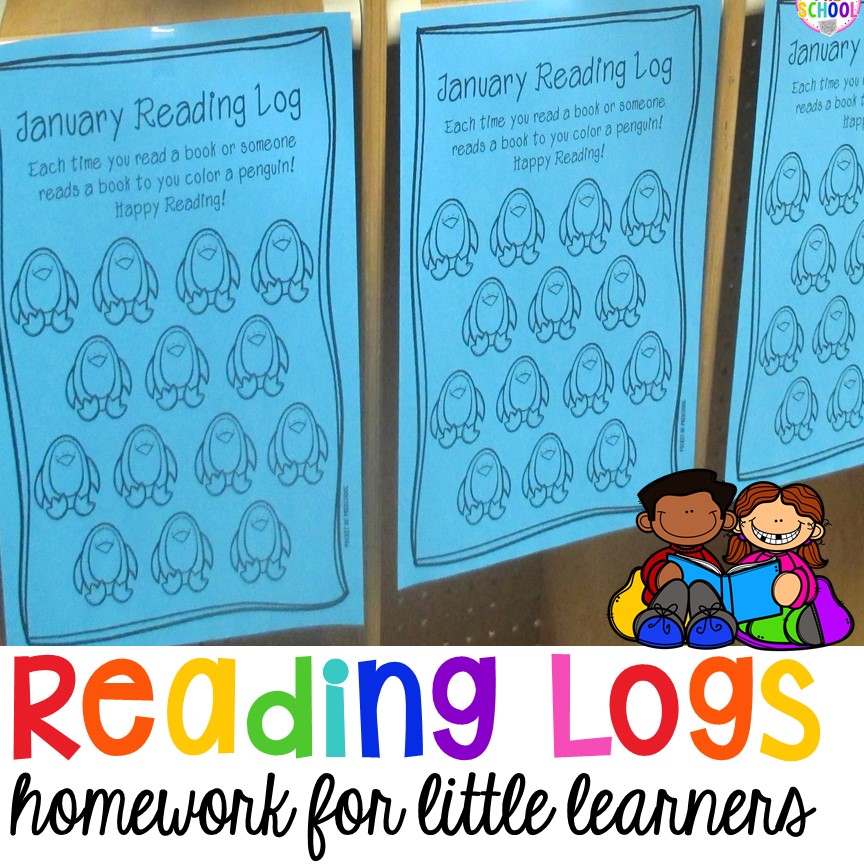
My preschoolers ASK for homework. They want to be just like their big brother or sister and do homework. They have also figured out that when their brothers or sisters do homework, they get extra one-on-one time with their mom or dad, so I created these preschool reading logs.
Preschoolers need developmentally appropriate learning time at home with mom and dad! For homework, each month, I send home a Monthly Home Readings Log, and the kids LOVE it! Each time a child “reads” or has a book read to them at home, they color a small picture on the reading log.
Once they have colored all the pictures for that month, they can bring them back to school to show the class (if the teacher wishes). We do a cheer for the students at our morning meeting if they bring it back to school. It will be simple, quick, and recognize the student for reading at home! I tape the reading logs to their cubbies and make a big deal about them each month. Reading logs are the perfect homework for busy families and my little learners!
Grab the FREEBIE by entering your email in the box at the bottom of this post . This post contains affiliate links which means I earn a tiny commission when you use my links at no cost to you.
Preschool Reading Logs
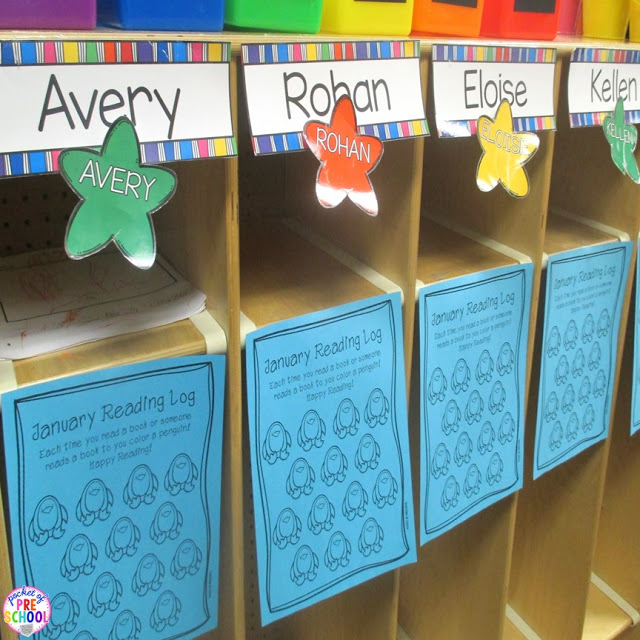
The monthly reading logs do not include dates so that you can use them year after year! Just print, copy, and send home! Print them on brightly colored paper to make them stand out.
Three Sets of Reading Logs to choose from: • Reading Logs with 20 items to color each month • Reading Logs with 15 items to color each month • Reading Logs with 10 items to color each month
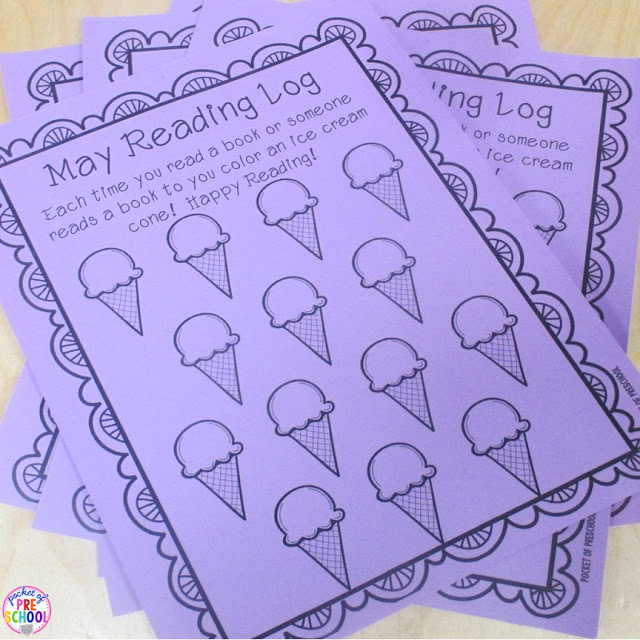
Reading at home can make a BIG impact in a child’s school success! For a preschooler or kindergartner, just reading 10-15 can make an impact on their reading comprehension, vocabulary, fluency, sense of story, phonemic awareness, and writing! Plus, it is quality family time at home!
I also send home Parent Handouts throughout the year attached to my newsletters and at parent-teacher conferences. It gives families ideas on simple activities they can do at home to help their child develop the skills they need. You can read all about them HERE or buy them HERE.
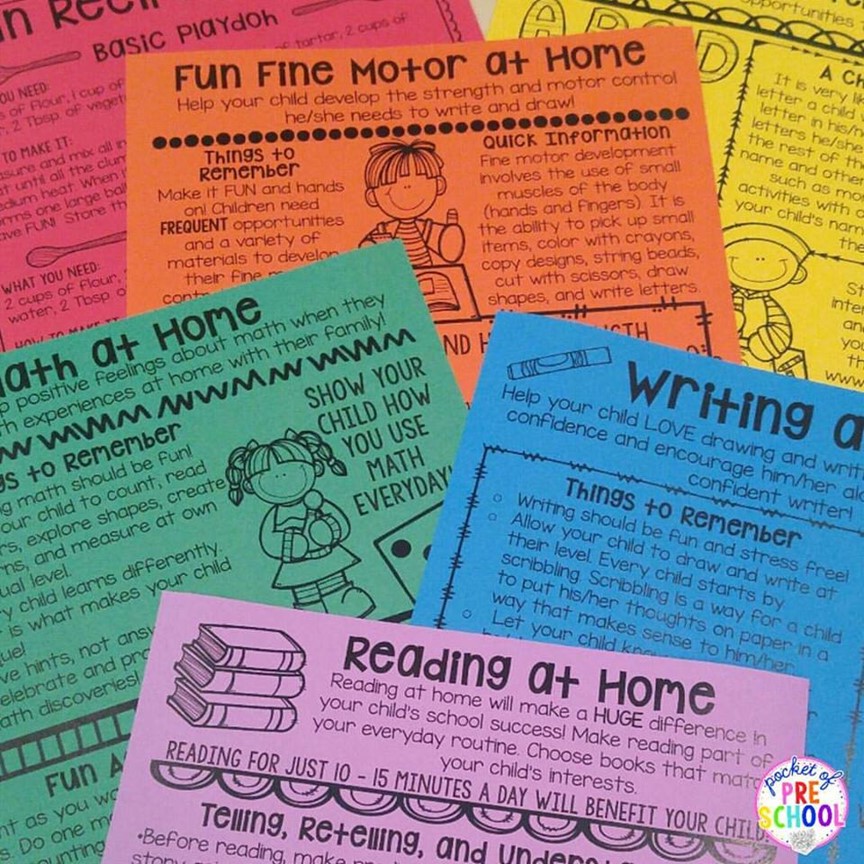
>>Grab the preschool reading logs FREEBIE by entering your email in the box at the bottom of this blog post!<<
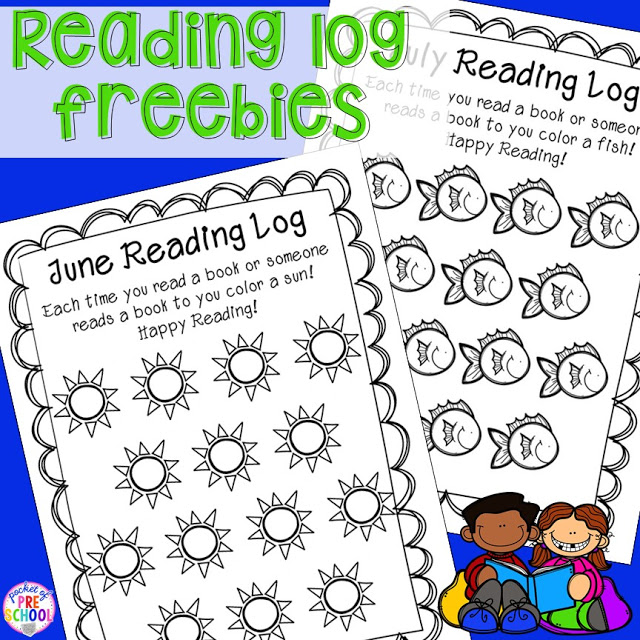
The first month I send the reading logs home, I attach the “Reading at Home” two-page parent note. The parent letter has reading and comprehension strategies, strategies to help their child develop as a reader, tips for making a home reading nook, a list of ways to make reading an adventure, and a list of media they can read other than books!
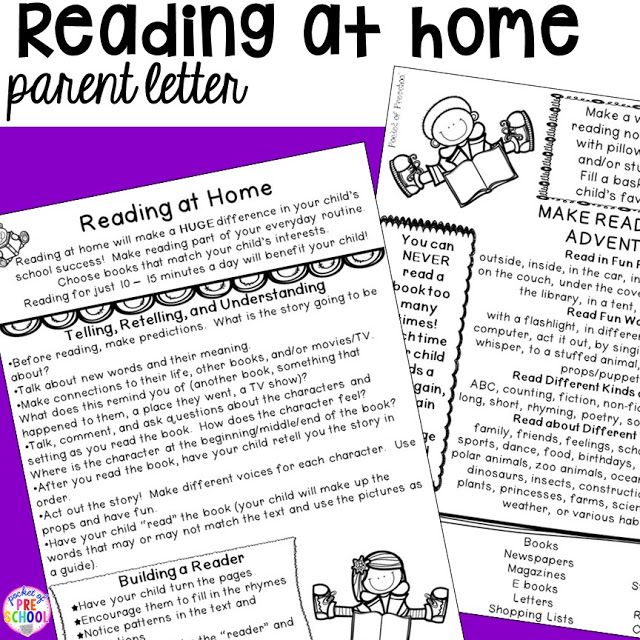
Want to try Reading Logs in your early childhood classroom? Grab them from my store HERE .
Love it? Pin it!
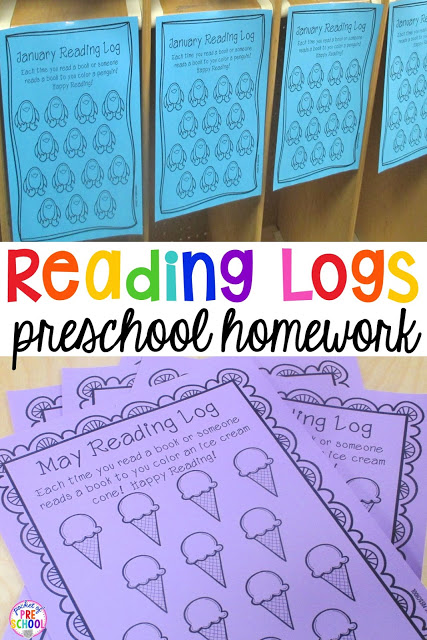
Check out my Preschool Reading Pinterest board. It is full of inspiration!
hey, i’m jackie!
I’m Jackie, your go-to girl for early childhood inspiration and research-based curriculum.
Similar Posts
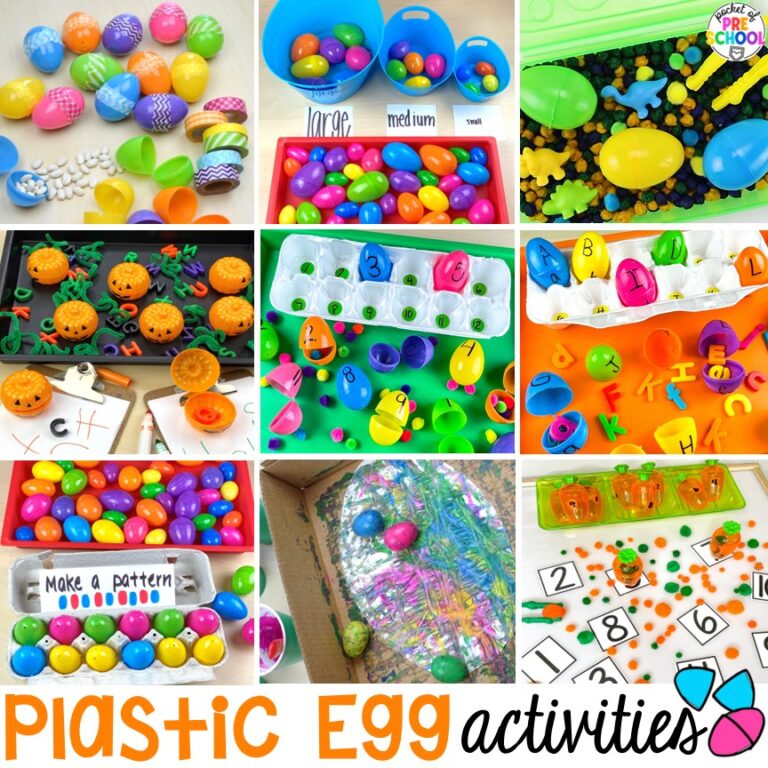
22 Plastic Egg Activities for Preschool, Pre-K, & Kindergarten
Plastic Easter eggs are a great manipulative that can be used for more than just Easter activities! I love using plastic egg activities in my classroom for a farm theme,…
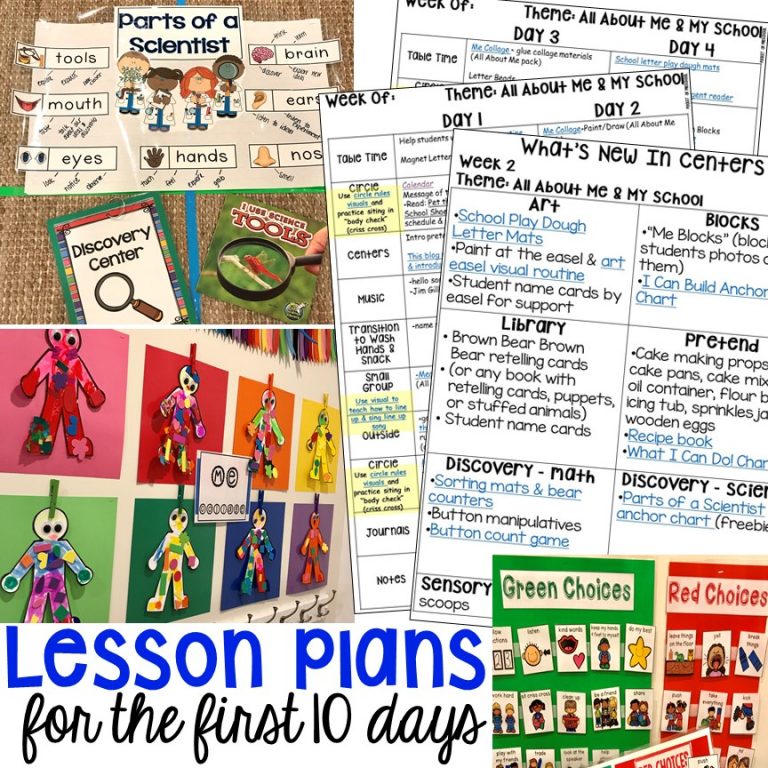
First 10 Days of School – Lesson Plans and MORE!
The first 10 days of school are exhausting for both teachers and students! There are so many routines to teach and so many little learners to get to know! My…
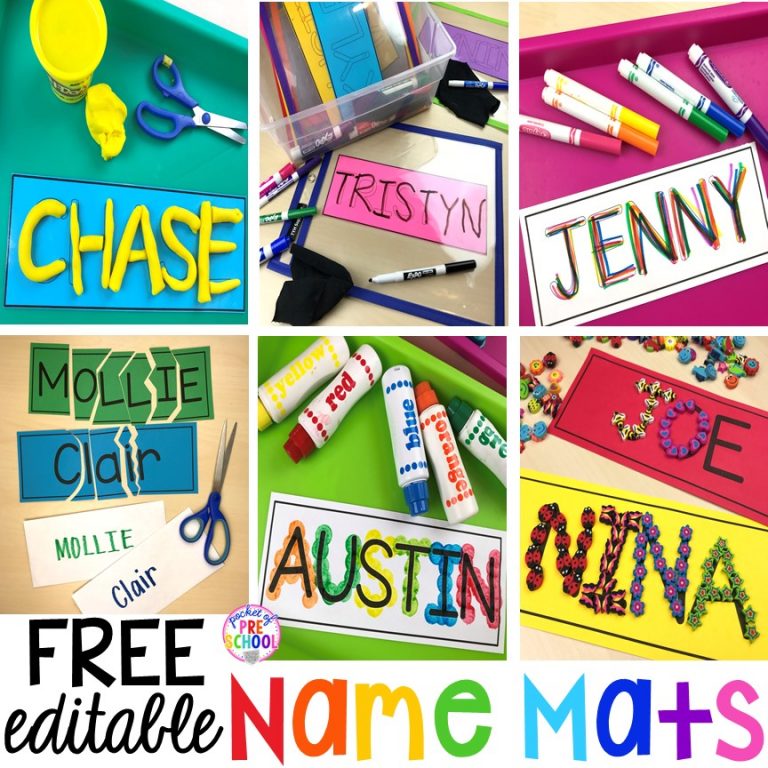
FREE Editable Name Mats
Teaching using student names is one of the most POWERFUL ways to teach letters and sounds to Preschool, Pre-k, and Kindergarten kiddos. I teach a multi-age classroom with 3, 4, and…
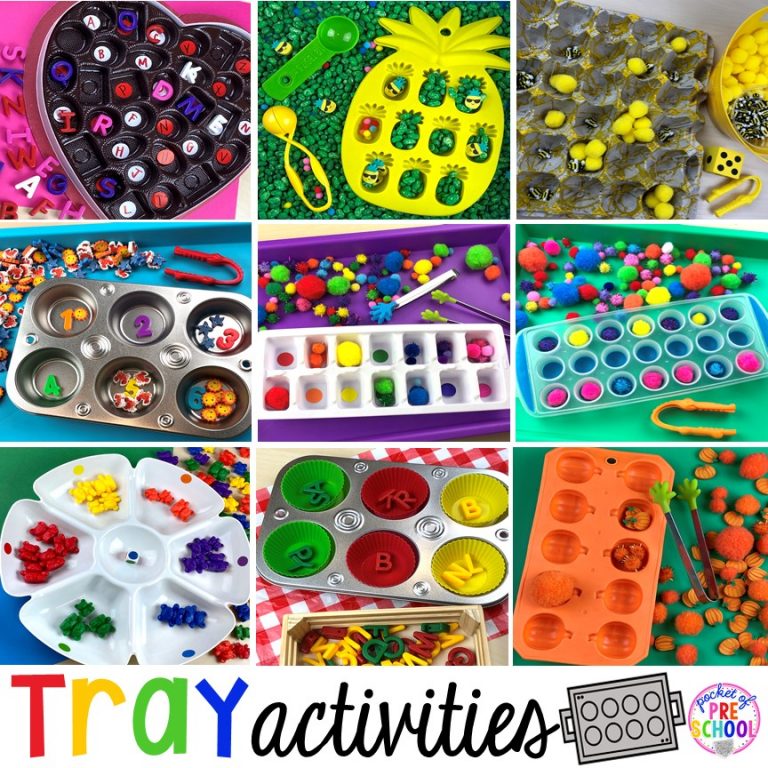
Tray Activities (Math, Literacy, & Fine Motor)
Start using tray activities in your classroom! Trays are super engaging and can build many skills with very little prep! Tray activities are perfect for centers, morning or departure table…
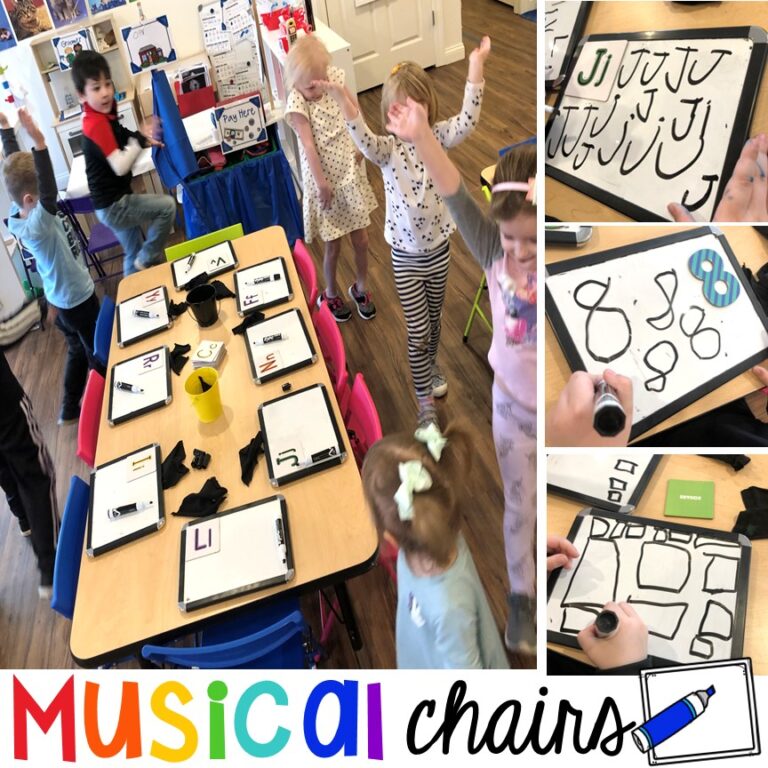
Letter Musical Chairs for Preschool
Having activities that engage your students in gross motor movement and an academic skill is such a fun and easy way to reach your preschool, pre-k, and kindergarten students. Try…
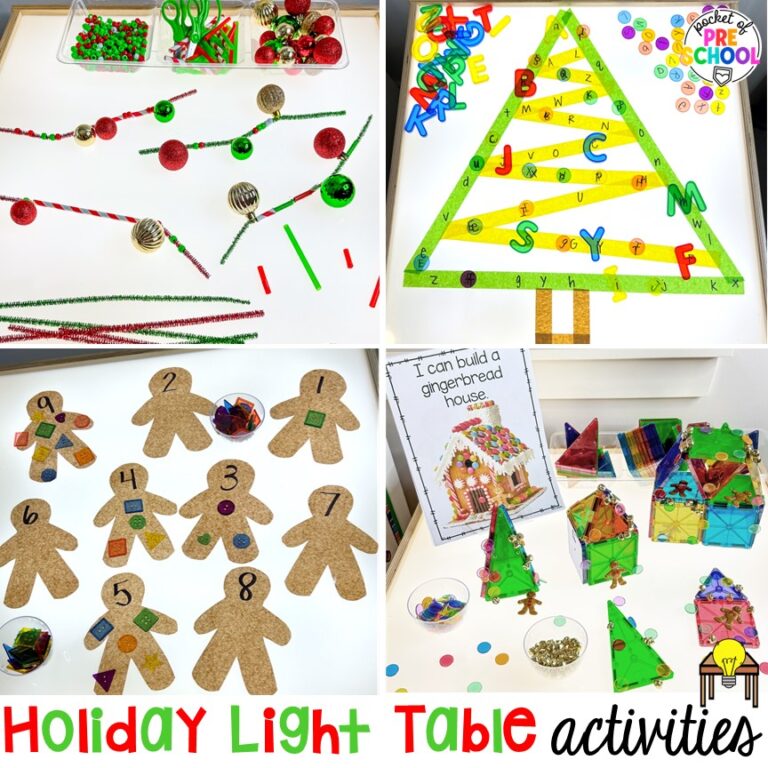
Christmas and Gingerbread Light Table Activities
Need ideas for your light over the holiday season? Check out this post about Christmas and gingerbread light table activities. There are so many simple ideas you can do on…
Follow On Instagram
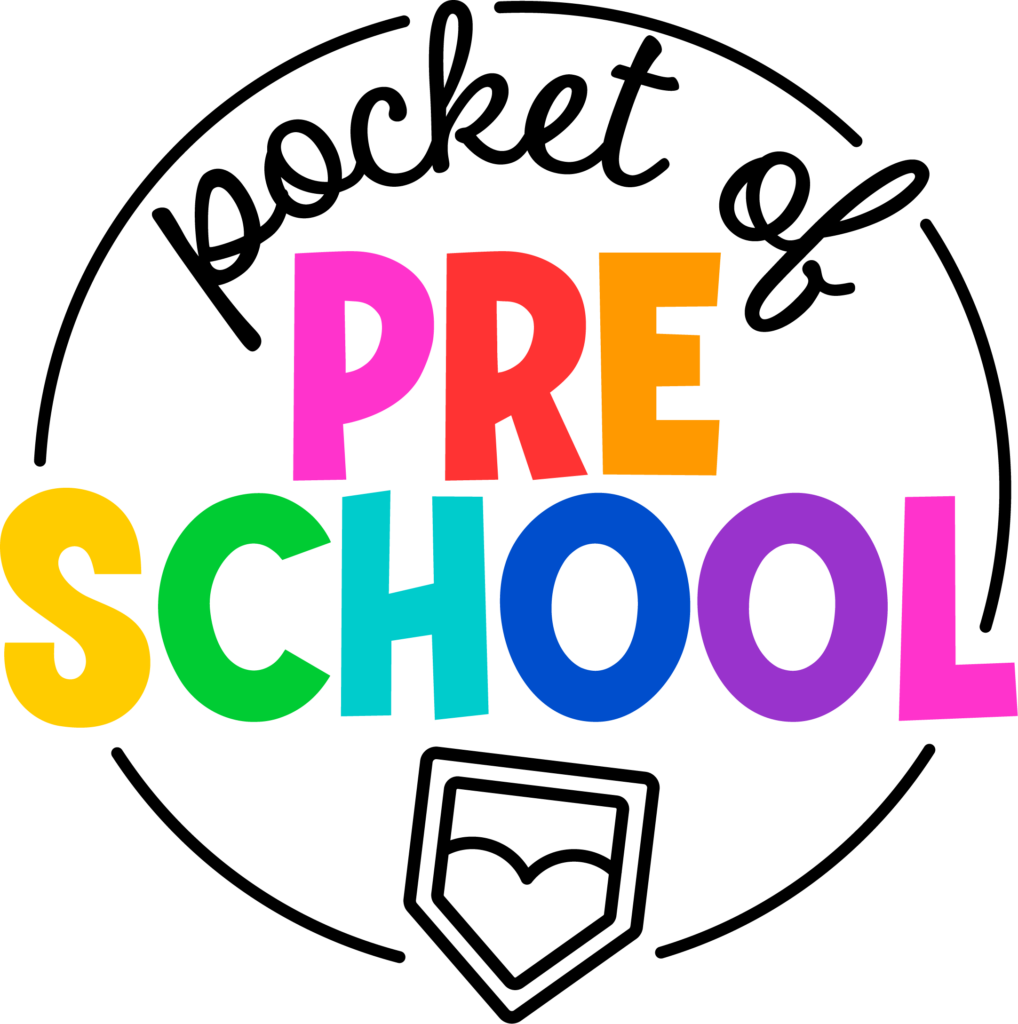
©2023 Pocket of Preschool. All Rights Reserved. Designed by Ashley Hughes
Review Cart
No products in the cart.
Dramatic Play
Social Emotional
- PRO Courses Guides New Tech Help Pro Expert Videos About wikiHow Pro Upgrade Sign In
- EDIT Edit this Article
- EXPLORE Tech Help Pro About Us Random Article Quizzes Request a New Article Community Dashboard This Or That Game Popular Categories Arts and Entertainment Artwork Books Movies Computers and Electronics Computers Phone Skills Technology Hacks Health Men's Health Mental Health Women's Health Relationships Dating Love Relationship Issues Hobbies and Crafts Crafts Drawing Games Education & Communication Communication Skills Personal Development Studying Personal Care and Style Fashion Hair Care Personal Hygiene Youth Personal Care School Stuff Dating All Categories Arts and Entertainment Finance and Business Home and Garden Relationship Quizzes Cars & Other Vehicles Food and Entertaining Personal Care and Style Sports and Fitness Computers and Electronics Health Pets and Animals Travel Education & Communication Hobbies and Crafts Philosophy and Religion Work World Family Life Holidays and Traditions Relationships Youth
- Browse Articles
- Learn Something New
- Quizzes Hot
- This Or That Game New
- Train Your Brain
- Explore More
- Support wikiHow
- About wikiHow
- Log in / Sign up
- Education and Communications
- Study Skills
- Homework Skills
How to Do Homework
Last Updated: April 15, 2024 Fact Checked
This article was co-authored by Ronitte Libedinsky, MS . Ronitte Libedinsky is an Academic Tutor and the Founder of Brighter Minds SF, a San Francisco, California based company that provides one-on-one and small group tutoring. Specializing in tutoring mathematics (pre-algebra, algebra I/II, geometry, pre-calculus, calculus) and science (chemistry, biology), Ronitte has over 10 years of experience tutoring to middle school, high school, and college students. She also tutors in SSAT, Terra Nova, HSPT, SAT, and ACT test prep. Ronitte holds a BS in Chemistry from the University of California, Berkeley, and an MS in Chemistry from Tel Aviv University. There are 11 references cited in this article, which can be found at the bottom of the page. This article has been fact-checked, ensuring the accuracy of any cited facts and confirming the authority of its sources. This article has been viewed 956,471 times.
Even though your parents probably complain about how hard it was in their day, students nowadays have more homework than ever before, even when just starting their first year at middle school. That homework doesn't need to be a struggle now. Learning to plan out an efficient schedule for completing your homework, working on it effectively, and knowing when to get help with difficult assignments can help take the stress out of studying. Don't put it off any longer. See Step 1 for more information.
Working on Homework

Once you go into your space and start working, try not to leave until you've got a break scheduled. If you want a quick snack or drink, get it now before you start. Hit the bathroom and make sure you'll be able to work for the amount of time before your next break, uninterrupted.

- It's common that students will try to multi-task, watching TV or listening to the radio or continuing to chat on Facebook or Instagram while also trying to do homework. It'll be so much more fun to do those things after you're already done with your homework, though, and your homework will take half as much time if you're focused on doing nothing but your homework.
- Check your phone or your social networking sites during your study break, but not before. Use these distractions as a carrot, not as a pacifier.

If one assignment proves challenging and time-consuming, it's okay to switch for a while to something else. Just make sure to save enough time to circle back and give it another shot.

- Try to figure out what works best for you. Some students might like to start their homework immediately after school to get it done as quickly as possible, while it may be better to give yourself an hour to relax before starting in on it and decompress from the long school day. Don't wait for the last minute.
- While it may seem like a better idea to work straight through and finish, it's possible that the quality of the work you're doing will start to suffer if you don't give your mind a rest. It's difficult to think hard for more than 45 minutes at a time on a particular subject. Give yourself a rest and come back refreshed.

- The first fifteen minutes after a break are your most effective minutes, because your mind will be cleared, and ready to work hard. Give yourself a pep talk and dive back in, refreshed and ready.

- If you have trouble staying focused, get a parent, sibling, or friend to help keep you honest. Give them your phone while you're working to avoid the temptation to check it, or give them the video game controller so you won't be able to plug in for a few minutes of alien-hunting when you're supposed to be doing your homework. Then, when you're finished, show them the finished product and earn back your fun. Make it impossible to cheat.

- You can make yourself take enough time by having your gate-keeper (the person with your phone or video game controller) check over your homework for quality when you're done. If you know you're not going to get it anyway unless it's done right, you won't have any reason to rush. Slow down and do it right.

Joseph Meyer
When doing practice problems, promptly check to see if your answers are correct. Use worksheets that provide answer keys for instant feedback. Discuss answers with a classmate or find explanations online. Immediate feedback will help you correct your mistakes, avoid bad habits, and advance your learning more quickly.
Planning Your Homework

- It's common to quickly write out the math problems you're supposed to do at the top of your notes, or scribble down the page number of the English reading on a textbook page, but try to recopy this information into a specific homework list so you will be sure to remember to do it.
- Write down as many details as you can about each assignment. It's good to include the due date, corresponding textbook pages, and additional instructions from your teacher. This will help you plan your night of homework more effectively. Also, it's a good idea to write about your homework in a planner.

- Homework doesn't have to wait until you get home. Look through an assignment as soon as it's been given, so you'll have the time to ask your teacher any questions you might have before you leave school for the day.

- At home , a desk in your bedroom might be the best place. You can shut the door and tune out any distractions. For some students, though, this is a good way to get distracted. You might have video games, computers, guitars, and all sorts of other distractions in your bedroom. It might be a better idea to sit at the kitchen table, or in the living room, where your parents can call you out for procrastinating. You'll get it done more quickly without the temptation of distraction.
- In public , the library is a great place to study and do homework. At all libraries, it's a rule that you have to be quiet, and you won't have any of the distractions of home. The school library will often stay open after school ends, making it a good option for finishing up homework before heading home, or your school may even have an after-school study spot specifically for the purpose. [11] X Research source
- Try to switch it up . Studying in the same place too often can make work more difficult. Some studies have shown that a change in environment can make your mind more active, since it's processing new information. You'll be able to vary your routine and remember what you learned more effectively.

- Try starting with the most difficult homework . Do you really hate the idea of getting into the algebra homework? Does reading for English take the longest? Start with the most challenging homework to give yourself the most time to complete it, then move on to the easier tasks you can complete more quickly.
- Try starting with the most pressing homework . If you've got 20 math problems to do for tomorrow, and 20 pages to read in a novel for Friday, it's probably better to start with the math homework to make sure you'll have enough time to complete it. Make homework due the next day the priority.
- Try starting with the most important homework . Your math homework might be difficult, but if it's only worth a few completion points, it might be less important to spend a lot of time on it than the big project for Social Studies that's due in two days. Devote the most time to the most valuable assignments.

- Set an alarm or a timer to keep yourself honest. The less time you spend procrastinating and checking your text messages, the more quickly you'll be done. If you think you can finish everything in a half hour, set a timer and work efficiently to finish in that amount of time. If you don't quite finish, give yourself a few extra minutes. Treat it like a drill.
- Keep track of how long you usually spend on particular assignments on average. If your math homework typically takes you 45 minutes to finish, save that much time each night. If you start plugging away for an hour, give yourself a break and work on something else to avoid tiring out.
- Schedule 10 minutes of break time for every 50 minutes of work time. It's important to take study breaks and give your mind a rest, or you'll work less effectively. You're not a robot!
Finding Extra Time

- Do you really need an hour of TV or computer after school to decompress? It might be easier to just dive into your homework and get it done while the skills are still fresh in your mind. Waiting a couple hours means you'll have to review your notes and try to get back to the same place you already were. Do it while it's fresh.
- If you've got three days to read an assignment, don't wait until the last evening to do it all. Space it out and give yourself more time to finish. Just because you've got a due date that's a long time away doesn't mean it wouldn't be easier to finish now. Stay ahead of the game. Try either waking up earlier or going to bed later. But don't get too tired!

- If you've got to read a bunch of stuff for homework, read on the bus. Pop in some headphones to white noise that'll drown out the shouting of other students and tune into your book.
- The bus can be distracting, or it can be a great resource. Since it's full of your classmates, try to get other students to work with you and get things done more quickly. Work together on the math problems and try to figure out things together. It's not cheating if everyone's doing the work and no one's just copying. Also, you might make some new friends while you're at it!

- Don't rely on this time to finish homework just before it's due. Rushing to finish your last few problems in the five minutes before you need to turn it in looks bad in front of the teacher, plus it doesn't give you any time to review your homework after you finish it. Rushing is a good way to make mistakes. And always check difficult problems you had trouble with.

- Work on your homework while you're waiting for a ride, while you're killing time at your brother's soccer game, or while you're waiting for your friend to come over. Take advantage of any extra time you have in the day.
Getting Homework Help

- Asking for help with your homework isn't a sign that you're bad at the subject or that you're "stupid." Every teacher on the planet will respect a student that takes their homework seriously enough to ask for help. Especially ask if you weren't there that day!
- Asking for help isn't the same thing as complaining about the difficulty of homework or making excuses. Spending ten minutes doing half your math problems and leaving most of them blank because they were hard and then telling your teacher you need help isn't going to win you any favors on the due date. If it's hard, see your teacher ahead of time and find the time to get help.

- If there's not an organized homework help group at your school, there are many private tutoring organizations that work both for-pay and non-profits. Sylvan Learning Center and other businesses have after-school hours that you can schedule appointments at to get help studying and completing your homework, while community centers like the YMCA, or even public libraries will often have homework help hours in your area.
- Getting help doesn't mean that you're bad at your homework. All variety of students visit tutoring centers for extra help, just to make sure they have enough time and motivation to get everything done. It's hard being a student! There's no shame in extra help. Imagine being afraid to ask for anything! You wouldn't be able to ask in restaurants, shops, anywhere!

- Make sure that your group study sessions don't cross the line into cheating. Dividing up an assigned so your friend does half and you copy each other's answers is considered cheating, but discussing a problem and coming up with a solution together isn't. As long as you each do the work separately, you shouldn't have any problems.

- Some parents don't necessarily know how to help with your homework and might end up doing too much. Try to keep yourself honest. Asking for help doesn't mean asking your parent to do your work for you.
- Likewise, some older relatives have outdated ways of completing specific tasks and might suggest forcefully that something you learned in class is wrong. Always use your teacher's approach as the correct approach, and discuss these alternative ways of completing an assignment with your teacher if necessary.
Supercharge Your Studying with this Expert Series

Expert Q&A

Reader Videos
Share a quick video tip and help bring articles to life with your friendly advice. Your insights could make a real difference and help millions of people!
- Make sure your little study space is well lit, quiet, and comfortable. This will make it much easier to do your homework properly. Thanks Helpful 1 Not Helpful 0
- If you missed school that day, then you should call a friend to get the notes and/or homework from that day. Thanks Helpful 0 Not Helpful 0
- Take a piece of paper or wipe board and create a schedule for your homework. Be generous with the amount of time that you give for each task. If you end up finishing a task earlier than the schedule says, you will feel accomplished and will have extra time to complete the next task. It makes homework get done quicker than usual. Thanks Helpful 0 Not Helpful 0
Tips from our Readers
- Make sure you have what you need handy when you get stuck on homework. Don't be afraid to ask questions if you're confused — asking helps you understand things better. And get enough sleep since it's easier to get your work done when you're well-rested.
- Don't put off starting homework just to have more playtime. Jumping in early leaves more free time for later but ensures you don't miss out on sleep. Plus, the class material is still fresh right after school, so you'll understand your homework better.
- Do your homework as soon as you get home every day except Fridays. On Fridays, give yourself permission to relax for the evening. Also, take short breaks as you work to help you focus. Play a quick game, eat a healthy snack, or use the bathroom.
- Ask for help when you need it, but don't rely on others to give you all the answers. The point of homework is for you to practice what you've learned, so try to work through problems yourself before asking for hints or explanations.
- Write down homework assignments in your planner right when your teacher gives them so you don't forget details later. Knowing exactly what work you need to do keeps you from being surprised.
- Break big assignments down into smaller pieces that feel more manageable. Taking things step-by-step makes big tasks feel less overwhelming, and helps you stay motivated.

- Never leave unfinished homework for the next day because you might have other homework to do and you will have to do both. Thanks Helpful 24 Not Helpful 0
- If you forget your homework, your teacher might not accept late work or may even give you more homework. Thanks Helpful 7 Not Helpful 1
Things You'll Need
- Writing equipment, such as pencils, rulers, and erasers.
- Resources that may help you work faster.
- A comfy place to sit while doing homework.
You Might Also Like

- ↑ https://www.warnerpacific.edu/5-tips-for-dealing-with-too-much-homework/
- ↑ https://www.psychologytoday.com/us/blog/mental-wealth/201206/10-tips-make-homework-time-less-painful
- ↑ Ronitte Libedinsky, MS. Academic Tutor. Expert Interview. 26 May 2020.
- ↑ https://bigfuture.collegeboard.org/plan-for-college/college-prep/stay-motivated/take-control-of-homework
- ↑ https://kidshealth.org/en/parents/homework.html
- ↑ https://writingcenter.unc.edu/tips-and-tools/understanding-assignments/
- ↑ https://kidshealth.org/en/teens/homework.html
- ↑ http://kidshealth.org/teen/school_jobs/school/homework.html#a_Create_a_Homework_Plan
- ↑ https://tutorial.math.lamar.edu/Extras/StudyMath/Homework.aspx
- ↑ https://learningcenter.unc.edu/tips-and-tools/studying-101-study-smarter-not-harder/
- ↑ https://kidshealth.org/en/kids/homework-help.html
About This Article

If you need to do homework, find a quiet, comfortable spot where you won’t be distracted. Turn off any electronics, like your TV, phone, or radio, and gather all of the supplies you’ll need before you get started. Work on the most important or hardest assignments first to get them out of the way, and if you have a homework assignment that actually seems fun, save it for last to motivate you to finish your other work faster. Keep reading to learn how to find extra time to get your homework done, like working on it on the way home from school! Did this summary help you? Yes No
- Send fan mail to authors
Reader Success Stories
Margaret Wessex
Dec 2, 2017
Did this article help you?
Doris Fasanya
Oct 25, 2017
May 27, 2017
Shibapriya Mukhopadhyay
Jun 3, 2017
Sep 13, 2021

Featured Articles

Trending Articles

Watch Articles

- Terms of Use
- Privacy Policy
- Do Not Sell or Share My Info
- Not Selling Info
Get all the best how-tos!
Sign up for wikiHow's weekly email newsletter

- News & Events
Homework Letter Update

Update - building log forts and banning homework worked.
First, thank you to the folks who have read my controversial post "Why we say "No" to Homework." I must admit, I was blown away by the thousands upon thousands who read that post.
Many of you have asked excellent follow-up questions, but since there were so many of them I didn't know how to respond at first. Now I know. I'm incorporating "Homework" as a major topic in my next renegade parenting book. Meanwhile, I'll answer one of your burning questions here.
What happened after our family wrote the " we ban homework " letter?
The letter sparked a good conversation with my son's third grade teacher. We talked about how we supported his education at home. We talked about her goals for the class and her goals for him. We agreed to no homework and that it was still his responsibility to master what kids were learning in class. Thanks to her flexibility and understanding of individual needs, the year went by without a glitch.
It seems more teachers are willing to be flexible in the younger years, especially if parents show they care and are involved. My child's first and second grade teachers also agreed to no homework for our family, but each year the pressure increased. This school, on the whole, believed in homework for elementary students and had the common "10 minutes a grade" policy. By 4th and 5th grade homework was expected to be 40-50 minutes long each night (though many families will attest it took much longer) and became more serious. We were heading into a true clash of education cultures.
So last year we changed schools. This is difficult in our small town because there aren't a lot of options. We now send both our kids to a charter school that basically has no homework until middle school. They encourage reading every night at home.
The individual approach -- the "no homework" letter -- is a difficult path that gets harder as children grow older. What really needs to happen is mass change and education of educators. For my next book, I'm digging into research that shows that there is no evidence that homework at the elementary school age helps at all . Many scholars dispute its worth at the middle school level, either, and that any homework over two hours a night for high school has a diminishing return.
So it's a happy ending for us. My son is in 5th grade now and tells anyone who will listen that he goes to a "really cool school!" But the problem is immense. Every day people find my blog by typing pleas on the internet like this: "my 7-year-old is in tears with three hours of homework" "homework is ruining my family" and "it's past 10pm and my 4th grader is still working on homework."
What's your update? For those of you who have tried to buck the homework system, what was the result? I'd love to hear from you.
What happened? Did it work for you? What's your homework story?

12 responses to “Homework Letter Update”
Hi Heather, As a Pre-K ECEer, I was rather stunned last year when a parent approached me to find out why her just-turned-four year old daughter wasn't reading yet. She was baffled as to why we weren't doing worksheets. I tried my best to explain my classroom, and that I would not be asking any of the children to do worksheets or pressuring them in any way to "learn to read" but rather providing a literacy rich environment within a larger child-rich environment. Don't know if my message got through to her, but I hope so! I love your book, my copy has so many dog-ears and creases... I share bits of it with whoever will listen! Thanks for making the language so easy to use! Cheers, Marta
Good to hear your story, Marta. Yes, I've heard from many teachers that parents ask for worksheets and homework, even at a young age. The process of education goes both ways. So glad the book is serving you well. Those kids are lucky to have you.
Love to hear others who have the same opinion on homework. My 17 year old is an "Out of the box" learner. He makes all A's, other than Algebra 2. When trying to speak to his teachers about his learning style all of them agreed with my opinion except his Algebra teacher. He would rather spend his time at home building computers, websites and Apps., riding dirt bikes and rebuilding his 73" Duster. We are blessed to go to a private school that has an understanding of learning styles:)) He is being moved from that class to a teacher who supports our decision. He still has homework but he is not up until 2 AM( seriously) like his classmates. I'm pretty sure he is going to grow up to be a healthy, happy, productive member of society!
Good for you for speaking up and finding a teacher that was a better match. Wonderful - thanks so much for sharing your story.
Heather, I've been fighting the homework battle for over two years. I have 7 kids - my oldest is now a high school senior, and I am sad to say that when he was in elementary school, I just didn't know better, and I would fight with him daily over homework, taking on the role of drill sergeant/enforcer, because that's what I thought I was supposed to do. It wasn't until my fifth child was in first grade a couple of years ago that I had kind of a revelation. She was coming home from school every day with a packet of worksheets to do, and she would cry and dawdle and complain that she was tired, and I would sit there and make her do her homework anyway. Then she started complaining of tummy aches and saying she didn't want to go to school, and that's when it hit me: this is all just too much for a six-year old. I started reading everything I could get my hands on about homework and realized that as a practice, it's not evidence based and has no intrinsic value, especially in elementary school. I tried to reason with my daughter's first grade teacher, but I was met with "My way or the highway." I ended up telling the teacher flat out that I just wasn't going to make my daughter do homework anymore and I really didn't care if her grades reflected it, and that teacher and I had this huge falling out over it, drama drama drama, blah blah blah. Anyway, my daughter didn't do any homework for the rest of the school year and did just fine academically. But since then, I've taken it to the district and the school principal, trying to get the homework policies changed, and nobody will budge. So I fight individual teachers about it, and sometimes they are receptive, and sometimes they are not. I now have a high school senior and a seventh grader, both of whom manage their own homework pretty well. I have two fifth graders (twins) who have daily homework, but I've made clear to their teacher that I will only support homework to the extent that it doesn't create stress and tension in our house, and that it doesn't interfere with other activities/pursuits. My fifth child is now a third grader and I'm actually pulling her to homeschool her because she's falling through the cracks at school. I really feel like her first grade teacher did her a huge disservice with her inflexible authoritarianism and turned my daughter off to school, rather than instilling in her a love of learning. In second grade my daughter was placed with a teacher who was counting the days until her retirement, and this year she's gotten placed in a 3-4 combo class with a teacher who is teaching full time for the first time - AND she's very committed to homework as a necessary practice. So I finally realized that if I don't do something a little drastic to try and turn things around for my daughter, she's going to have years of misery ahead of her.
Anyway, you're right that the problem is a big one. The whole thinking surrounding homework needs to change, but I'm really not sure how that is going to happen. I am really losing confidence in the public school system, what with overcrowded classrooms, Common Core, and homework policies that are not supported by evidence.
I write a blog about school and homework if you're interested: http://hometownhomeworkchronicles.wordpress.com
Also, I meant to address your point, too, about your son remaining responsible for mastering the material even without doing homework, and I just wonder how a child can do that when so often, teachers do make mastering the material dependent on homework. So often, it seems that teachers rush through lessons (I'm sure due to time constraints) and then expect the practice and application of the lessons to take place at home. How do we deal with that?
Good question Lisa! My son (a 9th grader) has wanted to only learn it in the classroom. When I have let him slack off on homework on and off through the years, my assessment is that he still doesn't know as much as I would expect. This shows up clearly with the scores on his math tests. Of course his math teacher would say he needed to do the homework for practice. They are on a block schedule, meaning there are chunks of classroom time that could be dedicated to math practice. I can't imagine the teacher talks the whole time. The end result is that the output is poor, time is wasted at school and at home. Unless I completely jump in and teach it to him, much understanding gets lost. When he is home sick, I do the teaching and get better results with less effort in a shorter period of time. A lot about life today is just pushing through the volume of things in our lives instead of truly learning and absorbing and appreciating life.
Good for you, Heather! I opted to homeschool for the same reasons. I hope your bravery has an impact on the public school system. Hooray for teachers who are willing to listen with an open heart!
[…] about what happened? Read the post Homework Letter Update. Share your […]
My daughter is about to start kindergarten. I was actually pretty surprised that she's expected to spend 20 minutes a night on homework even though she's going all day. I wrote a detailed letter in an email about why I don't plan to force her to do any homework she doesn't want to do in elementary school. I also told her that I am INCREDIBLY busy this year with working as a teacher (new position as a gifted intervention specialist), have a husband who also works all the time, and I have a 1-year-old and a 4-month-old at home. I explained that even if I wanted to do homework with her I really don't have the time. Reading together everyday is about all I can manage right now, and when I have more time I plan to spend that time teaching my daughter how to play piano. I said that if she falls behind (which I highly doubt as she's already very advanced for her age), I am willing to tutor her but only on the weekends as I'm too busy during the week. I also stated that I was aware she may disagree with me and was a bit nervous about her reaction. I tried to sound as respectful as possible, and I put a pretty good amount of time, effort, and feeling into the letter. So far the letter was received worse than I expected. I got a really short response that homework is the expectation in kindergarten.
I'm feeling pretty disappointed. I hope things go okay this year. I've heard this teacher is wonderful. I just can't believe people are such strong advocates of homework at such a young age!! I don't know any adults who had homework in kindergarten!
love this post and will share with the families whose kids I teach ... Why don't you homeschool? Just wondering and exploring for my own children
I watched my first child (now 12) cry and hate on himself as he struggled to complete the homework assigned in his cushy, crunchy, alternative private school that he attended through 5th grade. He was slow to read fluently due to a (later discovered) visual tracking issue, and although that was resolved with vision therapy, he developed the idea that he is bad at academics, specifically math. We solved the homework problem by pulling him and his sister out of school and are now homeschooling the older two, with two younger kids just beginning (one preschool and one in kindergarten - public school.) It's been 2 years and I am still trying to repair the damage to my son's image of himself as a learner from that homework experience.
I am happy to hear you have had success with your no-homework policy in your family, as it's what I have been planning for my younger ones, when they get there. Once they are through 3rd or 4th grade we will probably homeschool them also, but the sibling dynamics are too challenging for me right now.
Thanks for setting such a strong example!!
Leave a Reply Cancel reply
Your email address will not be published. Required fields are marked *
Get new blog posts by email
Popular posts.
- What to Say Instead of "Sorry"
- Chuck the Calendars
- The Good of Making Enemies
- How to Find a True Play-Based Preschool
- Behavior Charts = Poor Adult Behavior
- Debunking 'Choice' in Children's Behavior
- Lessons from a Pirate Ship Cake
- Why we Force Kids to Share
Most Read Posts
- Why We Say "NO" to Homework
- Throw Away your Timer: Why Kids Learn More when they Don't "Share"
Decorate your fridge with It’s OK wisdom!
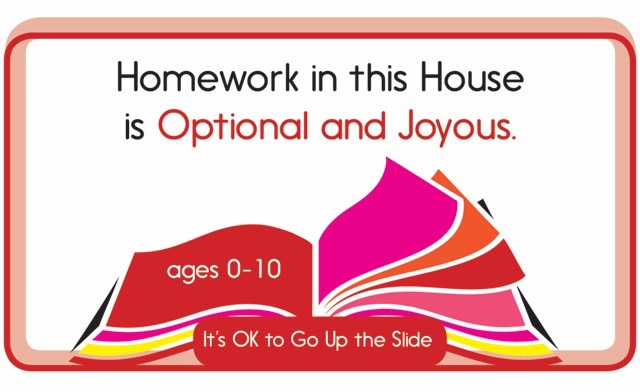

Free Printable Alphabet Book – Alphabet Worksheets for Pre-K and K
Practice the letters from A to Z with this free printable alphabet book.
Sit down with you child or your students and flip through the pages of this alphabet book, each page comes with letter tracing practice, coloring the objects (begging sounds) and coloring the letters.
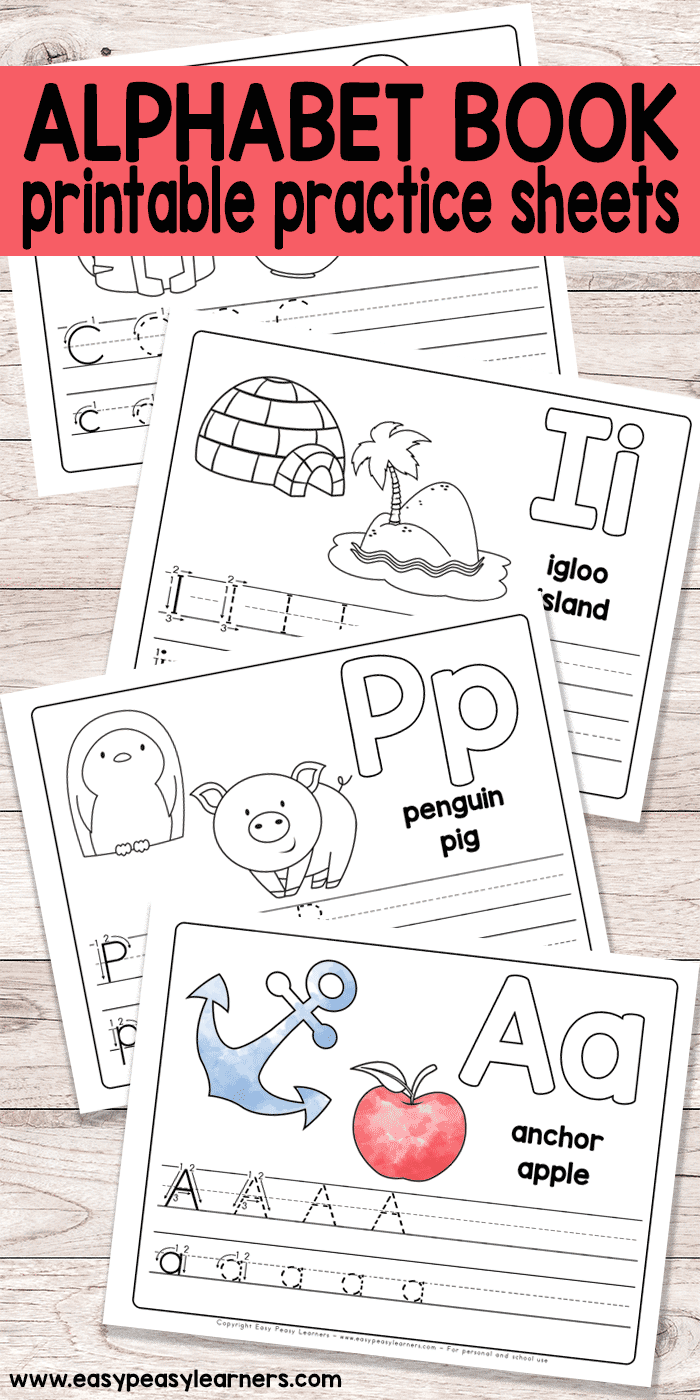
Printable Alphabet Book
This set of alphabet worksheets has one letter per page.
You can bind all of the pages together to make a alphabet learning book.
Educators (or parents) can also use these printable pages individually as worksheets for each letter of the alphabet.
If you intend to use the pages individually we do recommend that you laminate the pages to make them last longer.
Young learners will practice writing their letters as well as de-stress as they color the images and letters on each sheet.
There are two objects or animals on each sheet, both starting with the beginning sounds of the letter.
Preview the Pages and Grab the File at the End of This Post
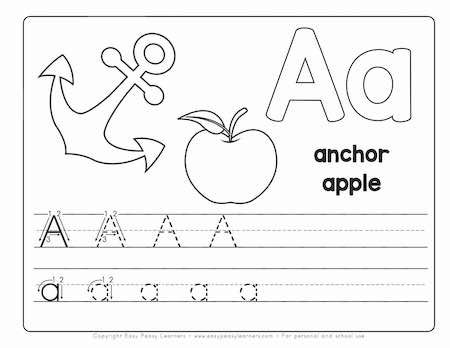
On the first page those two objects are an apple and an anchor.
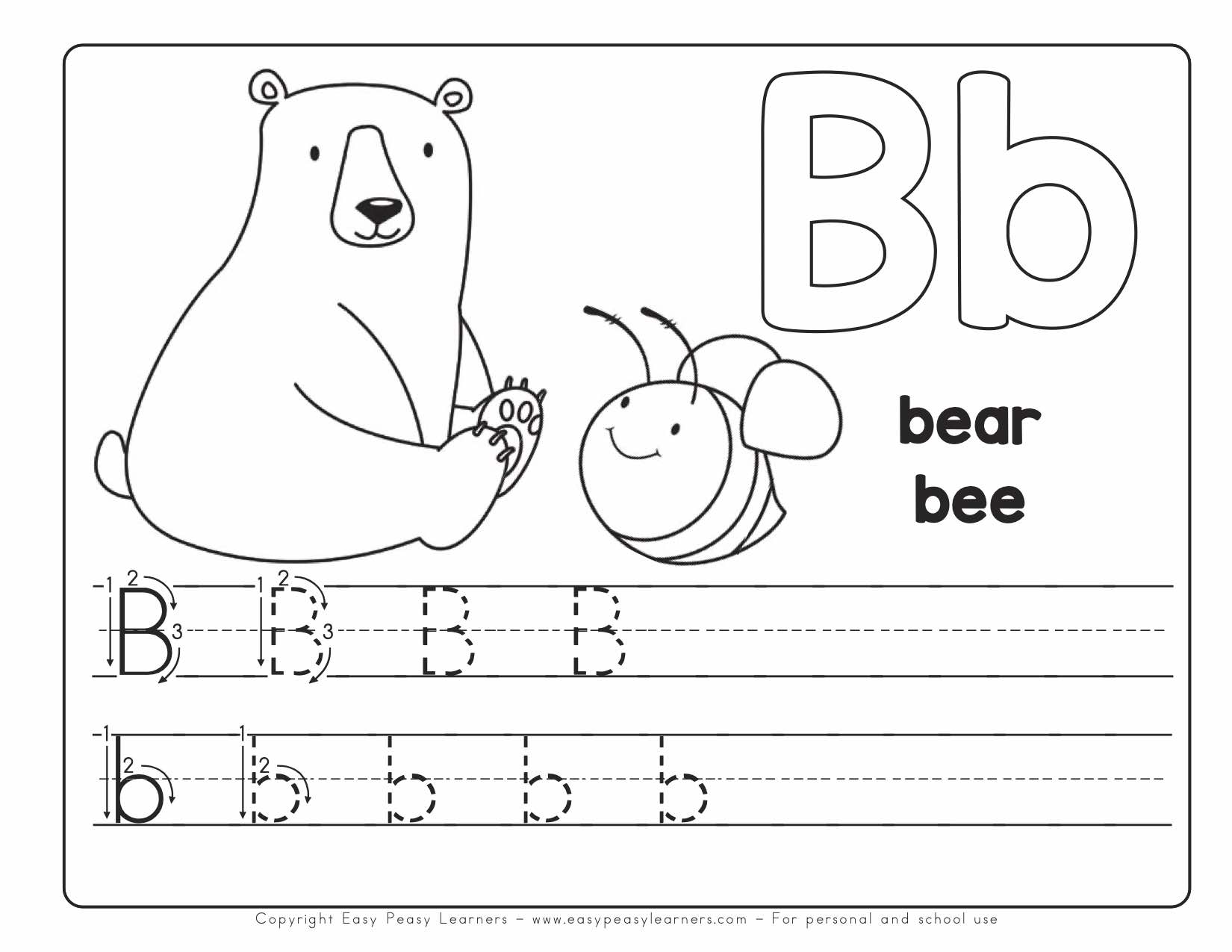
On the second page there is a bear and a bee.
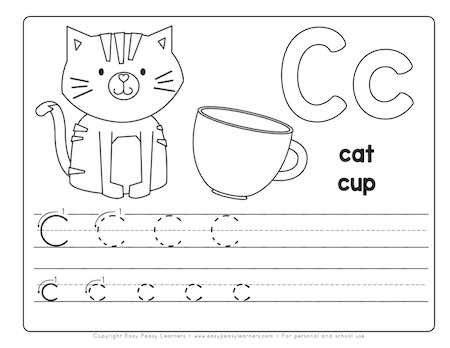
On the third page there is a cat and a cup.
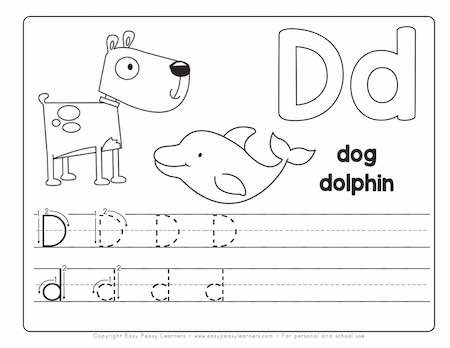
On the forth page there is a dog and a dolphin.
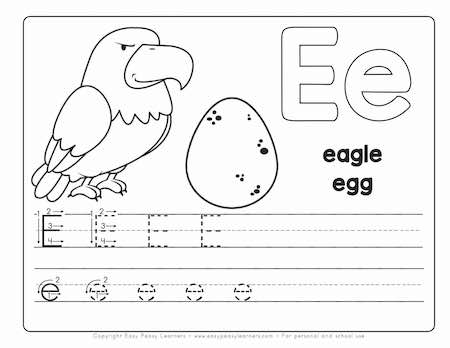
On the fifth page there is an eagle and an egg.
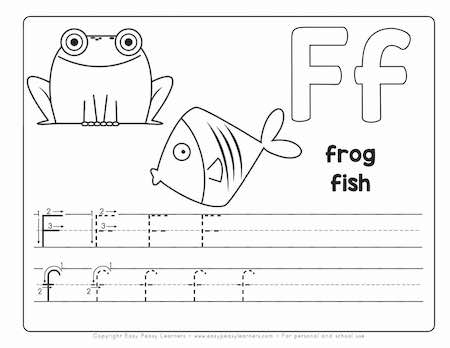
On the sixth page there is a frog and a fish.
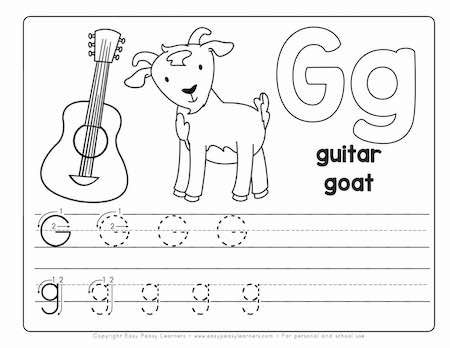
On the seventh page there is a guitar and a goat.
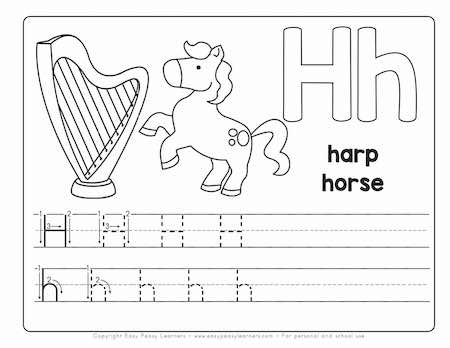
On the eight page there is a harp and a horse.
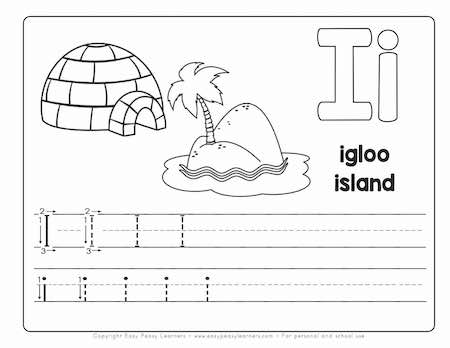
On the ninth page there is an igloo and an island.
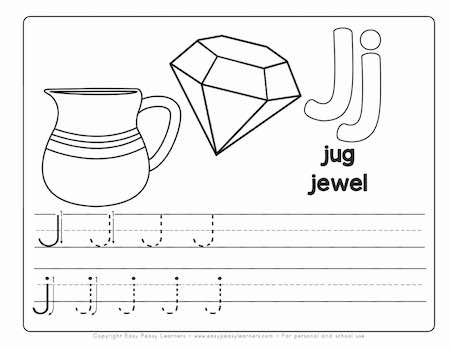
On the tenth page there is a jug and a jewel.
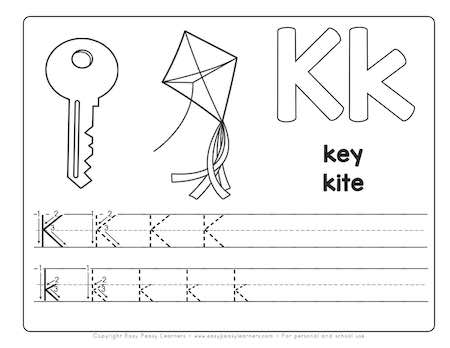
On the eleventh page there is a key and a kite.
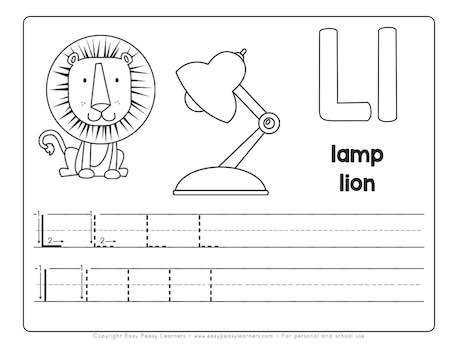
On the twelfth page there is a lamp and a lion.
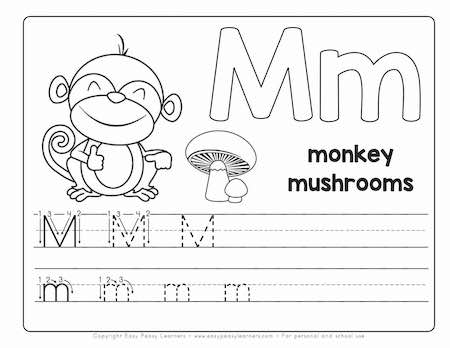
On the thirteen page there is a monkey and a mushroom.
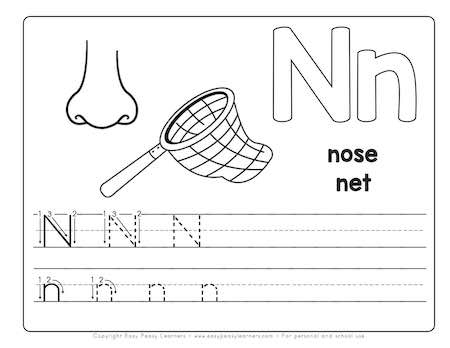
On the fourteenth page there is a nose and a net.
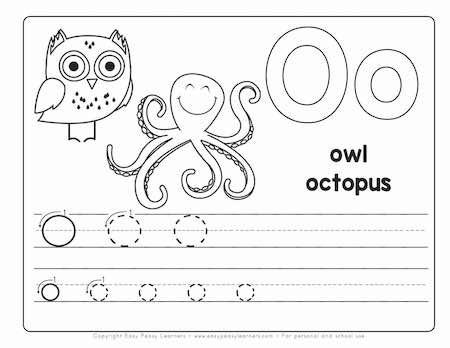
On the fifteenth page there is an owl and an octopus.
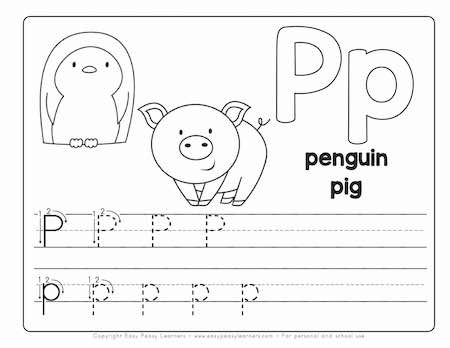
On the sixteenth page there is a penguin and a pig.
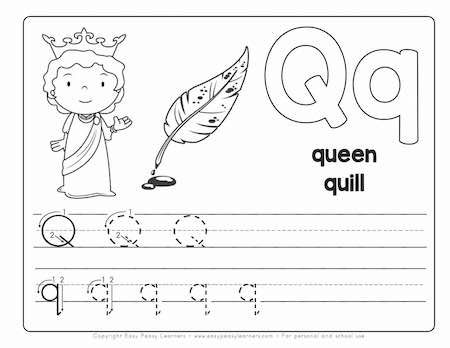
On the seventeenth page there is a queen and a quill.
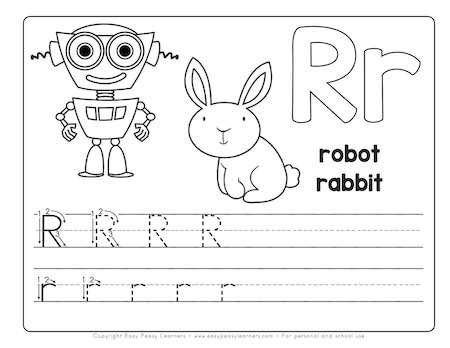
On the eighteenth page there is a robot and a rabbit.
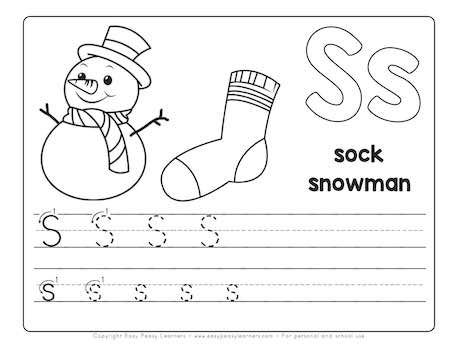
On the nineteenth page there is a sock and a snowman.
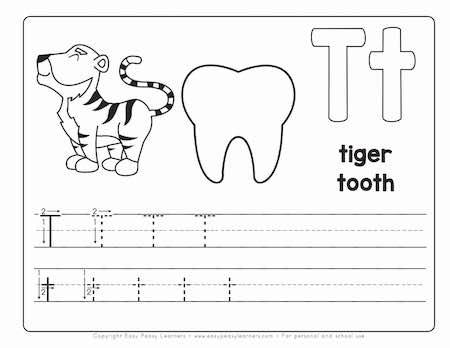
On the twentieth page there is a tiger and a tooth.
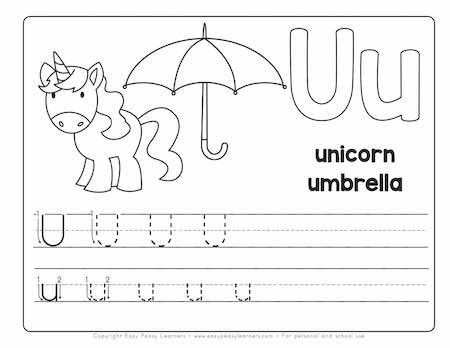
On the twenty first page there is a unicorn and an umbrella.
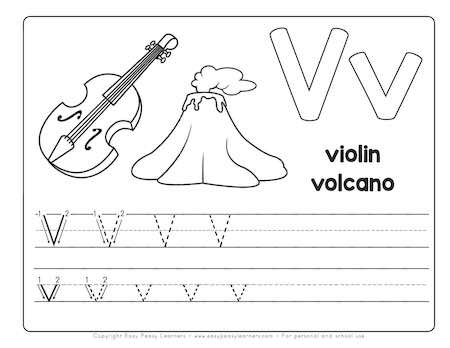
On the twenty second page there is a violin and a volcano.
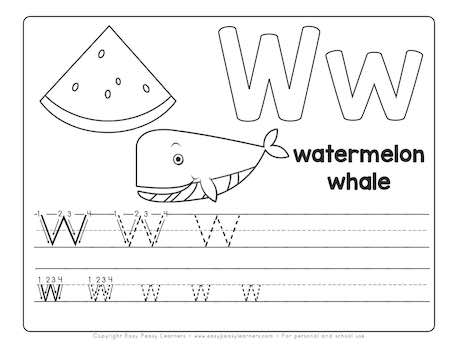
On the twenty third page there is a watermelon and a whale.
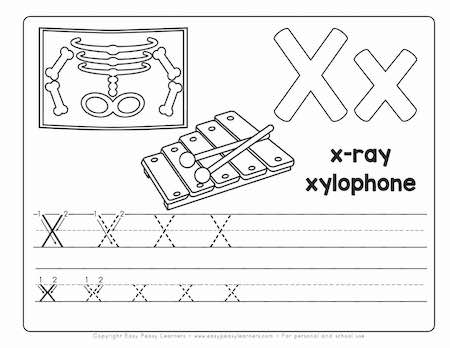
On the twenty forth page there is an x-ray and a xylophone.
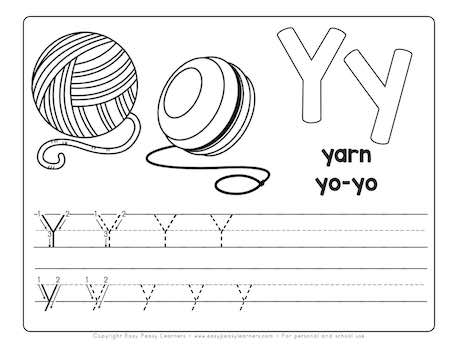
On the twenty fifth page there is a yarn and a yo-yo.
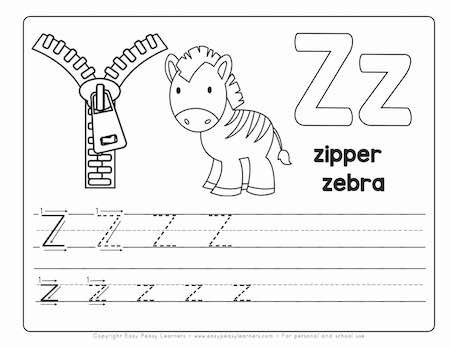
On the twenty sixth page there is a zipper and a zebra.
These worksheets work well as letter of the week homework material too.
Grab this freebie here – > My Printable Letters of the Alphabet Book
Other fun alphabet resources from the shop:
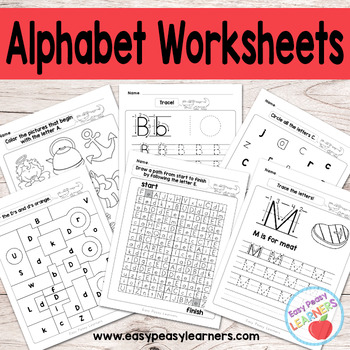
Alphabet Worksheets (A-Z)
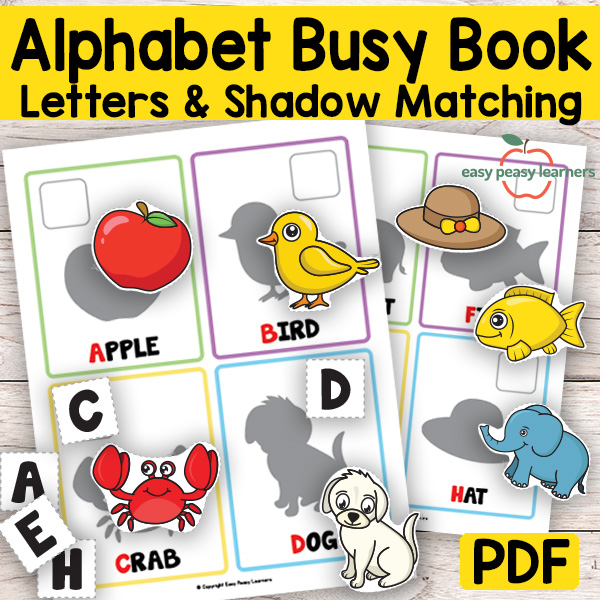
Alphabet Busy Book
More Alphabet and Early Literacy Resources From the Blog:
Alphabet I Have, Who Has Cards
Letter Mazes – Practice the ABC’s
Alphabet dot to dot Worksheets
Fill in the Missing Letter
Easy Read and Color Reading Comprehension
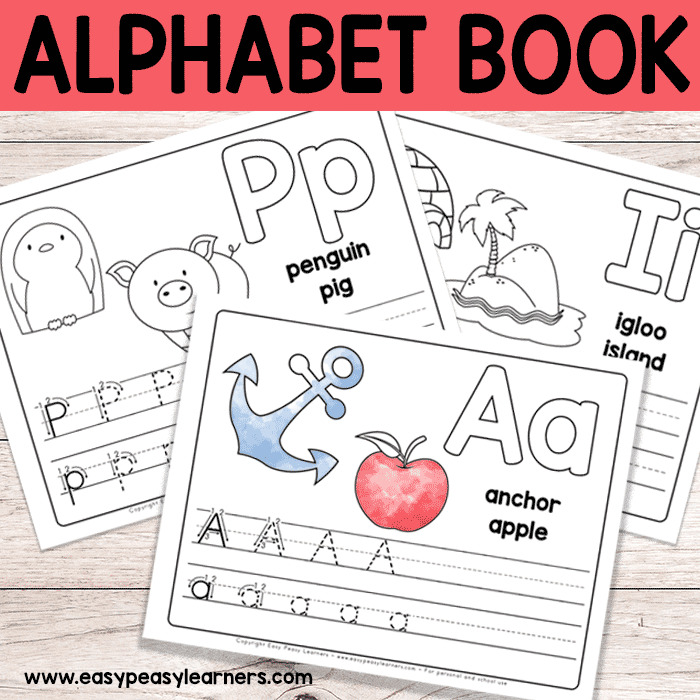
5 thoughts on “Free Printable Alphabet Book – Alphabet Worksheets for Pre-K and K”
Thank you for these, they’re very cute and straightforward. I’m hoping to laminate them and have them in the car for the kids to practice with a wipe off marker. Is there a way to do each page a half sheet instead of the 8.5 x 11?
This is awesome but I don’t see the download option from my mobile device. Please help!
Nevermind! I was still in Pinterest and needed to click “go to site”. Everything looked the same but your download link actually worked. Perfect! Thank you so much!!
Thank you so much for sharing your work, it is really appreciated
Thank you so much for the dot marker printable!! I love that they come in packs and you have a black and white option! I have 2 kids so we go through many pages of these and its fun to have a variety and not have to blow through the ink. I can’t wait until my kids can use some of the other packs for writing! Thank you for all your work on these and sharing them with others – what a special gift!
Comments are closed.
- Skip to main content
- Skip to footer
Miss Kindergarten
Kindergarten Teacher Blog
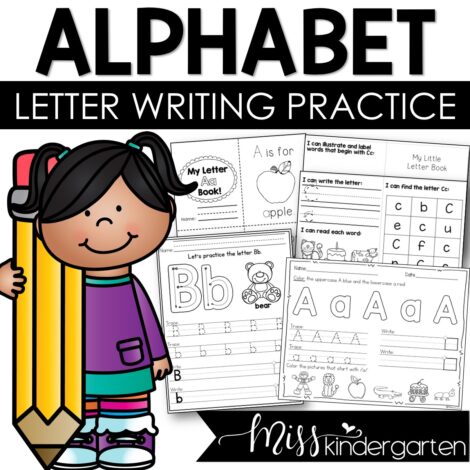
Alphabet Tracing and Writing Practice Printables
These alphabet practice pages are perfect to help your students master recognizing and writing the letters in the alphabet. With over 100 pages to help your students work on uppercase and lowercase letter formation while simultaneously reviewing letter names and letter sounds. These handwriting worksheets and mini books are perfect for your word work stations, literacy centers, morning work, or even alphabet homework.
D’Nealian print alphabet pages are also included in this download!
Total Pages: 100+
Alphabet , Back to School , Handwriting
Also available in the following bundles
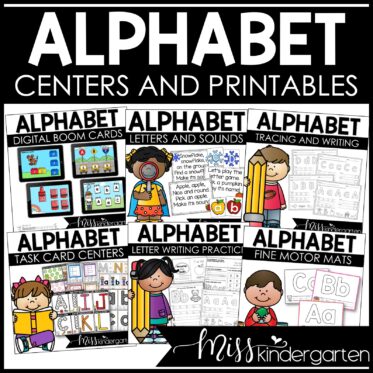
More about this resource
Recognizing and writing the letters in the alphabet is the foundation to become proficient readers and writers! Over 100 pages to help your students work on uppercase and lowercase letter formation while simultaneously learning letter names and letter sounds. These handwriting worksheets and mini books are perfect for your word work stations, literacy centers, morning work, or even alphabet homework.
These handwriting practice pages are perfect letter tracing activities for preschool and kindergarten students. You’ll have engaging alphabet practice for the entire year! No more dreading your handwriting time…simply print and go!
⭐ BUNDLE AND SAVE⭐
Find more alphabet practice including hands-on alphabet centers in the Fine Motor Alphabet Activities and Practice Bundle !
These alphabet activities are perfect for the beginning of the year or throughout the year to practice letter recognition, handwriting, and phonics.
What’s Included:
♥ Alphabet mini books (beginning sounds)
•26 books to practice tracing uppercase and lower letters
•Read the sentences using predictable patterns
•Color the pictures to increase fine motor strength
•Foldable or cut & staple format options
♥ Alphabet mini books (letter formation)
•26 foldable books focusing on each letter of the alphabet
•Writing uppercase & lowercase letters
•Practice reading the words/pictures that begin with that letter sound
•Identifying the letters
•Illustrating and labeling pictures that begin with the letter sound
♥ Alphabet worksheets (beginning sounds)
•Distinguishing between uppercase and lowercase letters
•Tracing uppercase and lowercase letters
•Writing uppercase and lowercase letters independently
•Identifying beginning sounds
♥ Alphabet worksheets (letter formation)
•Tracing the uppercase and lowercase letters for proper formation
•Showing their very best effort in the star box
♥ Alphabet interactive notebook
•26 alphabet pages for each letter of the alphabet
•Recognizing uppercase & lowercase letters
See why teachers love these!
⭐️⭐️⭐️⭐️⭐️ “I love these! I love that it helps students with handwriting , as well as listening for the beginning sounds . Perfect for morning work!” -Kindergarten teacher
⭐️⭐️⭐️⭐️⭐️ “I love this! I printed everything and made mini packets for my kiddos as an early finisher! Many of my students are not able to identify all of their letter name and letter sounds, YET, so this resource is simple and perfect !!” -1st grade teacher
⭐️⭐️⭐️⭐️⭐️ “Love using this! I have laminated and placed on the tables in the morning for my students to trace using a dry erase marker .” -PreK teacher
Find more alphabet practice including hands-on alphabet centers in the Fine Motor Alphabet Activities and Practice Bundle !
You May Also Enjoy These Resources
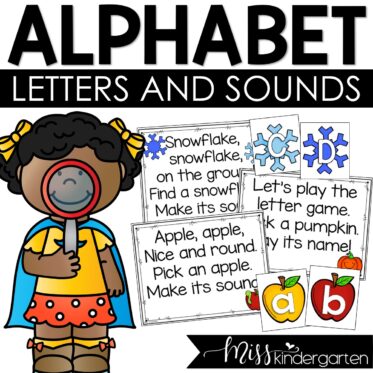
Helpful Links
- Free Resources
Popular Posts
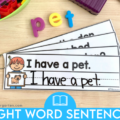
Sight Word Sentences for Kindergarten
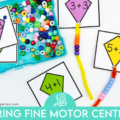
Spring Fine Motor Centers for Kindergarten

Leprechaun Crafts for Kindergarten
New in the shop.
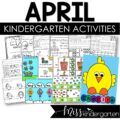

April Activity Bundle
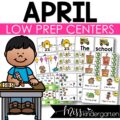
April Low Prep Kindergarten Centers Math and Literacy Centers
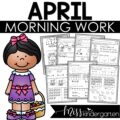
April Morning Work for Kindergarten
Check Out the New Website Shop!

Novels & Picture Books

Anchor Charts

- Back to School
- Building Community
- Classroom Management
Weekly Letter Writing to Build Community
By Mary Montero
Share This Post:
- Facebook Share
- Twitter Share
- Pinterest Share
- Email Share
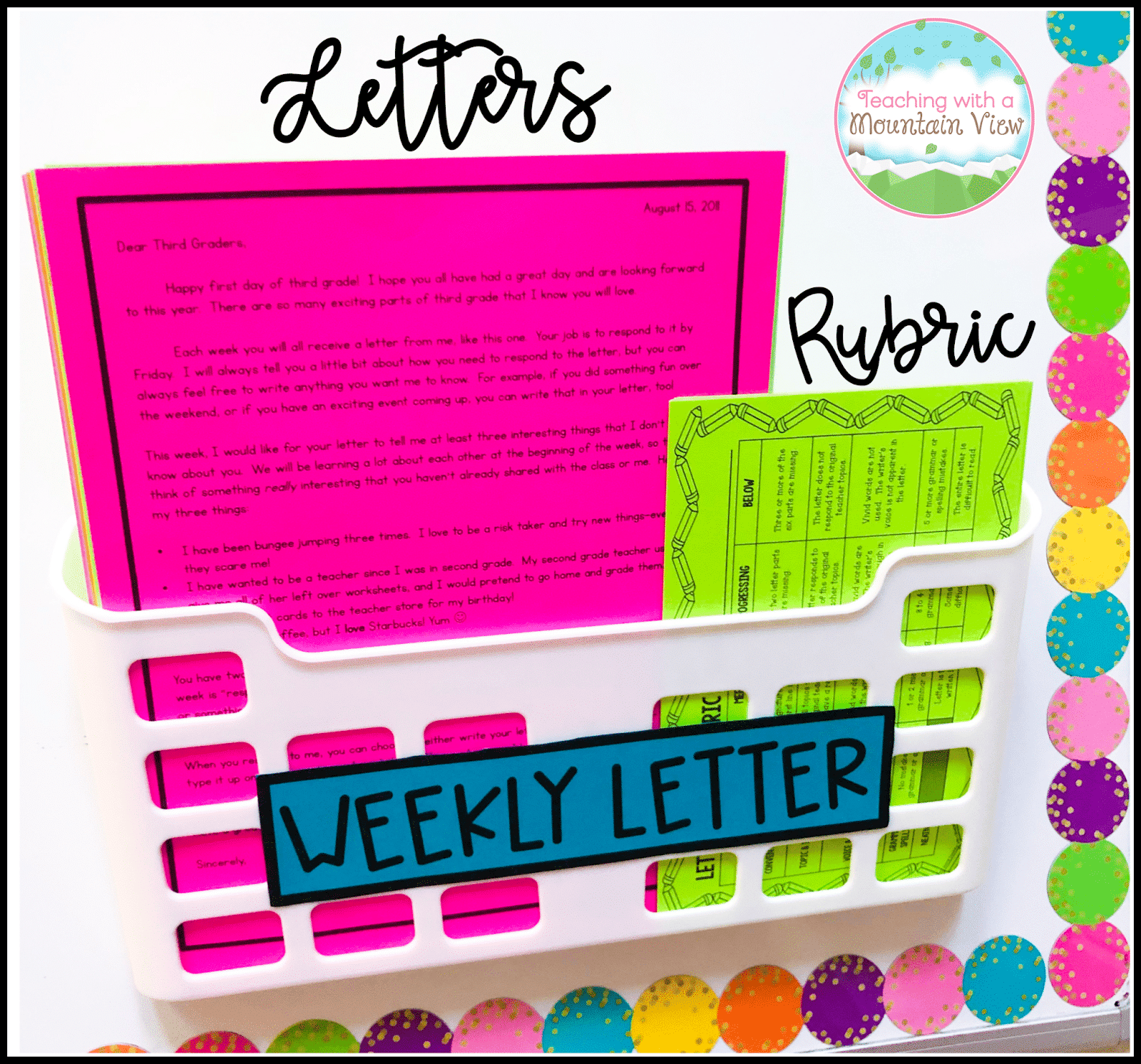
Years ago, I shared this idea as a free resource on TpT, but I’ve never gotten around to explaining my weekly letter writing procedures over here on my blog! It’s definitely time.

When I was student teaching, I had truly the best cooperating teacher I could have asked for. She was a phenomenal teacher (she’s now a principal), a master at building community in her classroom, and one of the kindest people I’ve ever met. I got so many wonderful ideas from her that year, and many of those ideas have become teaching traditions that still live on my classroom.
One of my favorite activities that I have implemented because of her is Weekly Letter Writing. The premise is simple: I write a letter to my students every week, and they write back. It’s the only homework I give ( click here to read more about my homework policy ), but it’s also one of the most important things I do in my classroom to build community. I’ve implemented this every year I’ve been in the classroom, and many of my colleagues have started doing it, too.
Why write letters each week?
First and foremost, the purpose behind writing letters is to build relationships and connect with my students. Every single week, I get to read a personalized note from my students, and they get to read one from me. I get to know them better, and they get to know me better, too.
Second , it’s an amazing way to have students practicing writing skills in a super fun and interesting way. I have watched kids blossom from two sentence letters at the beginning of the year to full-page letters by the end of the year. While they may not always be SUPER excited about the prospect of this (or any homework) at the beginning of the year, they always grow to love it.
Third , it’s an important opportunity to allow students to reflect on what is going on in our world and in our classroom. Since I write the letters each week (more about that below), I’m able to incorporate current events in the world as well as address certain things going on in our classroom.
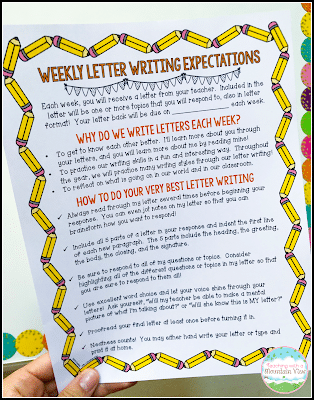
What do I write letters about?
So many different things!
I start every letter with one or two sentences about something fun going on in my life (I usually write them on Sunday evenings or Monday morning, so I do a quick recap of my weekend.) Then I decide on my “topic” for the week. When I worked in an International Baccalaureate (IB) School, I would focus on one IB attitude each week or on our central idea. If you’re working on a certain social studies topic, incorporate that into your letter. If you’re reading a book, think about how they can reflect on that book in their letter. Consider local, national, or worldwide events and discuss them. Look at seasonal topics. The possibilities for what to write about are truly endless.
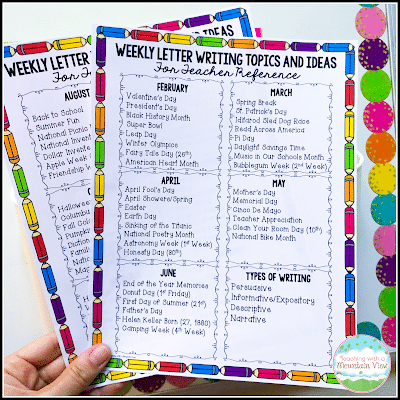
I usually model a response to my prompt within the letter I write. If I’m asking them to think about empathy, I’ll write about a time I showed empathy (or didn’t show empathy…). I always include a prompt in my letter (and bold it so that it’s clear what they need to write back about) that they should respond to, but students often add more details and tidbits about their lives.
I have to write to them every week? Doesn’t that take a lot of work?
First, the letters are pretty short. If I’m writing a new one, it usually only takes about 10 to 15 minutes to draft.
Second, I save my letters and do use similar prompts year after year. One grade level team I worked with that decided to implement this grade-wide came up with “templates” that we all used every year (based on our current topics) and then we just added in our own little notes, current events, etc. each week. This made sending them home every week a BREEZE!
If you want to use templates for your weekly letters, this Weekly Letter Writing resource includes an editable template for every single weekly letter . Just open, add a bit of personalization, and print. That’s it! It includes:
- Weekly Letters for each month of the school year – they’re all editable so you can personalize them with your own anecdotes and classroom content
- Student Responses – A letter template for students to respond to your letter
- Rubric to grade students’ responses
- A letter explaining the project to students/caregivers
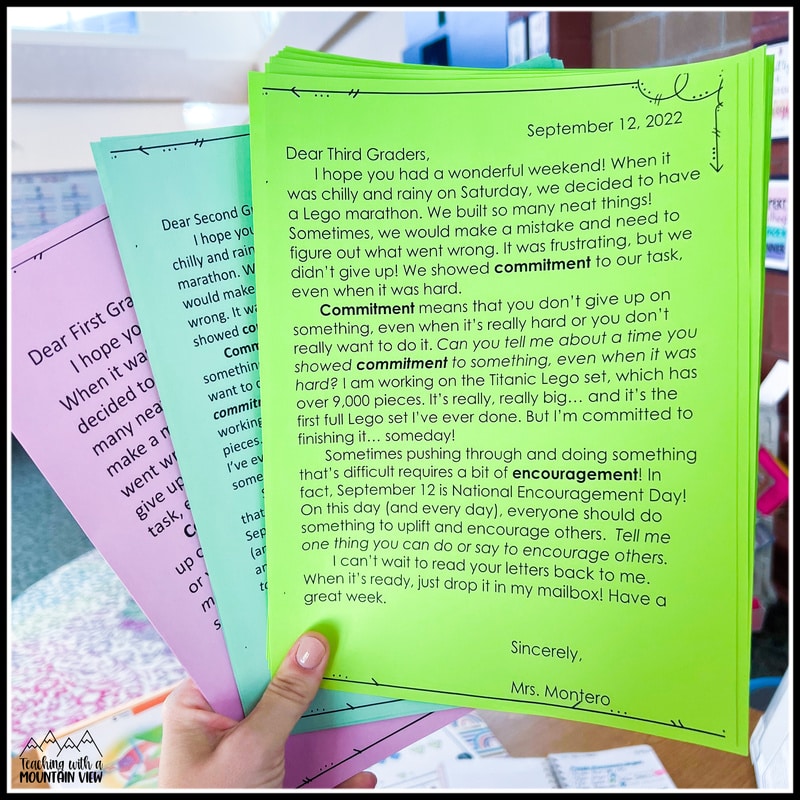
Do I grade and respond to every letter?
Grade? No. Respond? Briefly.
I am not exaggerating when I say this is the one piece of work that I look forward to reading more than any other. Kids tend to really get into this– typing them out, adding borders, clip art, folding them into fun shapes, putting them into envelopes. They take great pride in their letters, so I really enjoy reading them.
I choose maybe one a month to use the rubric (included in the free resource below) on, but I don’t necessarily count it as a grade since it’s homework, and I don’t know what level of help they received on it.
I write short responses to letters. Sometimes it’s as simple as responding with a “WOW!!” in the margins where they’ve written something interesting, or a quick “Me too!” comment. Sometimes, I write one or two sentences back (on the letter they wrote me). My kids are always eager to read my responses when they get them back the following week.

How do I get started?
I usually start this during the very first week of school. Some years, I have introduced it on the first day of school. It depends what grade level you teach and how much pre-teaching of letter format you’re going to have to do. But you definitely want to start this as soon as possible.
I have created a letter writing starter kit so that you can easily get going with letters in your classroom! It includes an information sheet for students, letter topic ideas and examples, and a short rubric for grading them, if you so choose.
You can download the letter writing starter kit for free below.
Years ago, I wrote about this idea as a guest blogger on Laura Candler’s blog. Clear HERE to read the original blog post that includes a few different ideas!
Mary Montero
I’m so glad you are here. I’m a current gifted and talented teacher in a small town in Colorado, and I’ve been in education since 2009. My passion (other than my family and cookies) is for making teachers’ lives easier and classrooms more engaging.
You might also like…

Leave a Reply Cancel reply
Your email address will not be published. Required fields are marked *

©2023 Teaching With a Mountain View . All Rights Reserved | Designed by Ashley Hughes
Username or Email Address
Remember Me
Lost your password?
Review Cart
No products in the cart.

15+ Letter J Worksheets: Fun & Printable!
Need some fun and free letter J worksheets for your kindergarten students or preschool lessons?
The below letter worksheets will help your younger children work on letter formation, handwriting, letter sounds, letter identification, and more.
There are also some fun activities and coloring pages for those ever developing fine motor skills!
Scroll through the sheets below to get some tips from me on teaching the tenth letter of the English alphabet.
At the bottom of the post, you will find a link that will take you right to a PDF instant download file for all the worksheets.
Free Printable Letter J Worksheets!

A fun way to kick off learning the letter J sound is to color all the pictures that have a beginning sound of /j/.
The above worksheet shows a jaguar drinking juice, a jet zooming off, a jar, a jellyfish, a jack in the box, jellybeans, and a jetski.
As you are doing this simple activity with your young learners, you may have someone call out “giraffe” or “gym” or “germ” as an example of a J word.
While your young children are just learning this letter of the alphabet, I would wait to fully explain that those are soft “g” words. Just gently say you will talk more about those special “J words” another time.

This practice sheet will help your child learn to write the uppercase letter J and the lowercase j.
The dotted lines and line height give plenty of space for practice.
Be sure to tell your child to pay close attention to which direction the “tail” of the J goes as they are writing it.

On this next page, your young student can now practice writing uppercase letters and lowercase letters independently of dotted lines.
There is still lots of space for small hands to practice, make mistakes, and improve.
One of the most important skills of letter formation with the letter J is that the lower case letter j has a distinct dot above it. Make sure their dot is not too light and doesn’t blend into the line below.
This skill will be similar to what they already learned with the letter I .
The capital letter J has a straight line across the top…but sometimes it doesn’t.
More on that later down below.

This letter identification worksheet will have your child sifting through a jar of capital letters that seem to have spilled on the floor.
Can they find all the Upper case J circles with their Do-A-Dot marker?

This letter recognition worksheet will have your young learners sifting through an ocean of small letters.
Can they find all the j-j-j-juggling letters among the other letters of the alphabet?

This printable worksheet is always a hit with young children.
The opportunity to have some fun, be creative, and do something original!
****If the child is at all struggling with the letter J, I would recommend they tell you what they intend to draw before they start.

This alphabet worksheet is a great way to check-in and make sure the child is grasping the beginning sounds of J words.
They should color jeep, jar, jellyfish, jacket, jeans, jewely, and jump rope.
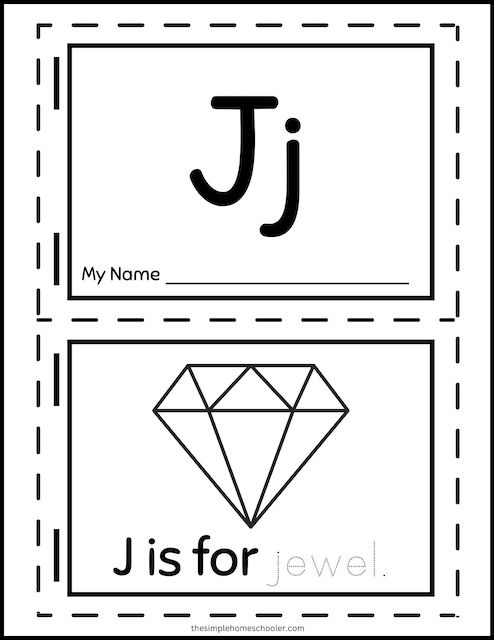
I love making alphabet books for learning letter sounds!
Have your child color the picture and finish tracing the simple sentences.
Cut them out and easily bind with staples.
For best results, keep it on hand for kids who are struggling with telling the difference between /j/ sounds and /g/ sounds.

Another letter j coloring page!
You really can’t have too many.
Your child should color in jacket, jaguar, jellyfish, jewel, and juice.

Many kids will struggle with remembering “which way” the letter J goes, so I included a little extra practice with tracing activities and writing the letter Jj.
If you haven’t already, let your child know that some people (and compter fonts) do not cross their captial J. Your student will need to know that for future tracing, writing, and reading.
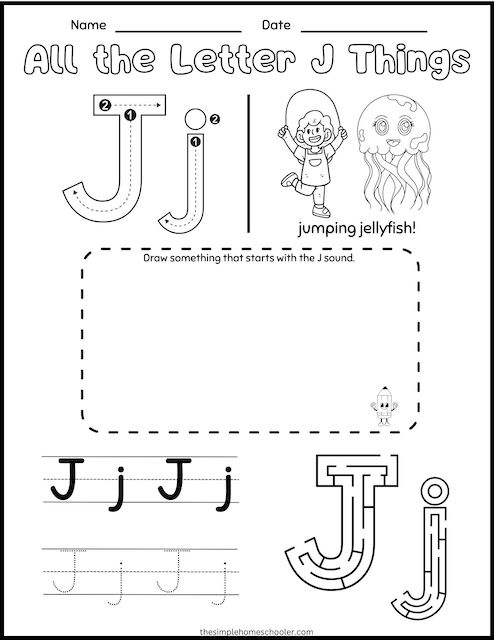
This is the last of the printable activities, and hopefully a fun one for your child!
There are several different activities: mazes, letter tracing, drawing pictures, and coloring.
Teaching your child the term “Jumping Jellyfish!” will definitely be a fun way to close out the week of letter J!
Click Here For Your Printable Download Your Letter J Worksheet Packet!

I hope you and your kindergarten kids had more than enough fun with these letter j activities and all of the free alphabet printables on this site!
They should feel ready for all things lowercase letter j, uppercase j, the j sound, letter j identification, and more!
If you’re looking for more alphabet worksheets or alphabet activities, be sure to check out the educational activities in the next alphabet letter.- K!
Also check out these Cursive Alphabet Worksheets for a cursive letter j worksheet !

Thank you so much for these free worksheets!!!!
I would like to say thank you dear providers . You helped me to equip my self and to give to my beloved students more practical letter practice . Tnx again .God bless you .
Leave a Reply Cancel reply
Your email address will not be published. Required fields are marked *

10 Great Letter G Worksheets – Teaching Tools (2023)

When teaching the letter g, you need to give students plenty of opportunities and practice. Adding worksheets to your letter curriculum is a great way to give them a variety of activity types. And since worksheets are printable, these are fast and easy to use.
We found some of the best letter g worksheets available so you can quickly find what you are looking for all in one place. Browse the options below to find the set that meets your needs best.
Engaging Letter G Worksheets
1. hands-on letter g playdough mats.
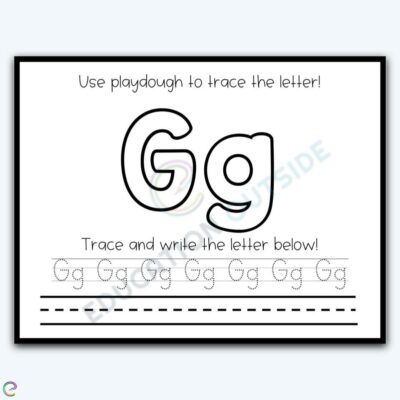
Just add playdough to get your students playing and learning. Anytime you can add a hands-on component, it is sure to get kids interested. These easy, printable letter g playdough mats from EducationOutside do exactly that!
Not only is there a large upper and lowercase g for kids to trace with playdough, they also get a line for practicing tracing and another line for writing the letters independently. These require no prep work, although for repeated use, you can either laminate them or use in page protectors. Use these mats for centers, individual practice, or for at-home practice.
2. The Letter G! Alphabet Letter of the Week Package
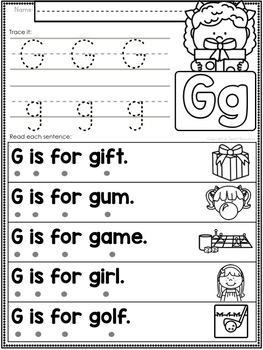
This collection of classroom printables is perfect for your letter g curriculum. With over 20 pages of practice, you’ll have plenty of materials to work with. As an added component, you get a 15-page digital set of worksheets that is compatible with the Seesaw app and Google Slides. You can use these for distance learning, at-home practice, literacy centers, for ELL instruction, or for morning work.
These letter g worksheets by TweetResources are chock full of engaging and hands-on activities such as an artwork printable, spin a letter, color by code, picture search, a show and tell activity, and more! You even get a color poster and picture cards for your classroom decorating. This thorough letter of the week package focusing on letter g is printable and would be a great addition to your teaching plans.
3. Letter G Activity Pack
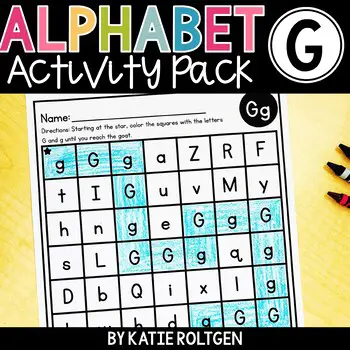
KatieRoltgen’s letter g worksheet set features 10 activities to help kids practice. The activities include color and trace, mystery letter, sorting, a mini book, letter crown, and more! With 10 options, you can add the right worksheet right when you need it.
Each kid-friendly page is attractive and fun. These are excellent for homework packets, sub plans, centers, group instruction, or wherever they fit into your letter g curriculum. With no preparation required, you can use your planning time for other important tasks.
4. Emergent Reader Phonics Letter G Worksheets
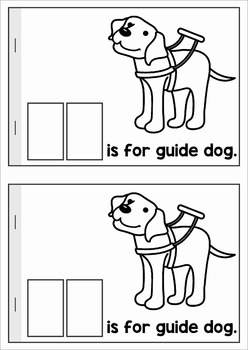
When just starting out, kids need easy, straightforward practice with the letters of the alphabet. LaviniaPop’s worksheet set for beginner readers provides exactly that. Not only that, it also features both Australian and American spellings for your convenience. These emphasize letter formation, recognition, and sound recognition.
With this set, you get over 80 pages of practice! You are sure to find an activity to fit any letter g curriculum or teaching style. You’ll find activities like build a sentence, flip books, letter find, a playdough mat, cut and paste readers, and so much more.This allows you to differentiate with minimal work on your part to make lesson planning easier.
5. Letter G – Beginning Sound Coloring Page
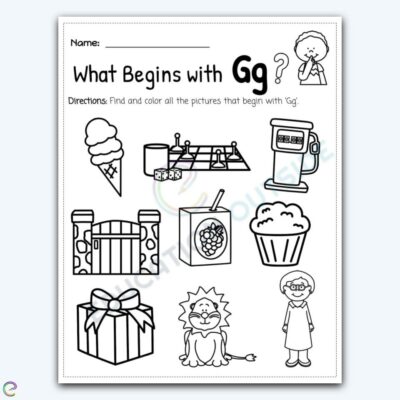
This letter G coloring page from EducationOutside features a variety of clip art for kids to hunt through to find the matching sound. This is great for beginners who are learning to associate the letter with its sound. Circling the pictures also helps develop fine motor skills.
Since this requires no preparation, you can just print and go. Use this for morning work, homework, as an assessment tool, or just a fun anytime activity.
6. Tracing Sheets for Letter G
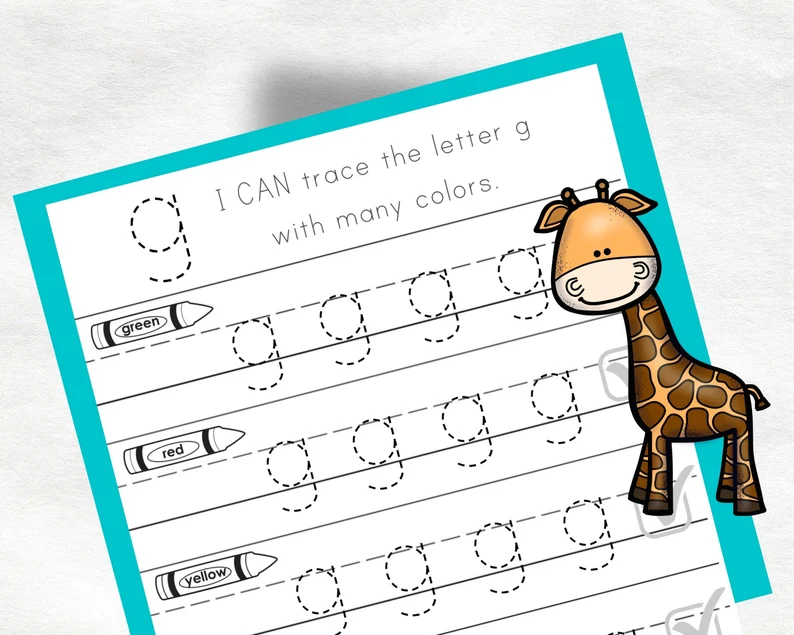
Tracing is a vital component to letter and word formation. These letter g tracing sheets from DesignsByBekkiSayler provide pages of practice to improve fine motor skills as well as letter recognition. Each sheet features the lowercase letter g and features various type of tracing. Kids can check off their progress as they trace, color, cut, count with the self-check boxes at the top.
These worksheets are so cute, fun, and perfect for beginners. Print out one or all for your daycare, preschool, or kindergarten students and you’re ready to go. With these, you can target fine motor skills , letter identification and recognition, and letter sounds all at once!
7. Read to Learn – Letter G Basic Sentences
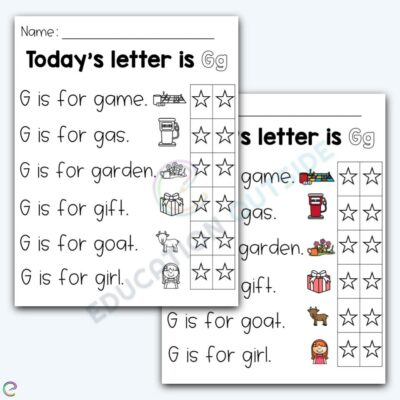
Learning letters is a building block to reading. Give kids the tools to do both at once with EducationOutside’s letter g sentences . Each sentence repeats but uses a different “g-word” so kids can learn to correlate the letter with its sound.
The sentences include a picture clue to help kids easily decode the unknown word. The repetition improves reading fluency, sight word recognition , and instills confidence in your students’ reading skills. And, best of all, these require no prep work, which makes your planning easier, too.
8. Letter G Emergent Reader Activity Pack
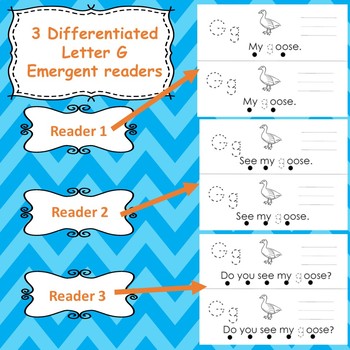
This differentiated set is great to use in a classroom of students at different ability levels. KatlynWhite’s letter g activities provide a poster to display in your room, 3 differentiated emergent readers, a phonics sorting center, a phonics reading center for building rebus sentences, and 7 sets of letter g word work sheets. The set totals over 50 pages and will provide everything you need for your letter g curriculum.
Whether you need practice for ELL, preschool, kindergarten, or as intervention tool, this set has what you need to teach and reinforce the letter g. These worksheets require no prep work so they are ready in minutes.
9. Alphabet & Phonics Worksheets -Letter G
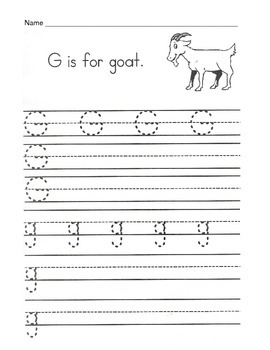
With this letter g phonics set from KellyConnors , you get 5 different ways to practice this letter and its sound. These can be used as homework, independent practice, literacy centers, morning work, or whenever some letter g practice is needed.
The activities include 2 penmanship sheets, a sentence writing worksheet, beginning sound picture identification, and uppercase and lowercase letter identification. All you have to do is print these off and get started. Choose the worksheet(s) that fit your day’s curriculum best and you’re ready to teach.
10. Complete Letter G Recognition and Identification Pack
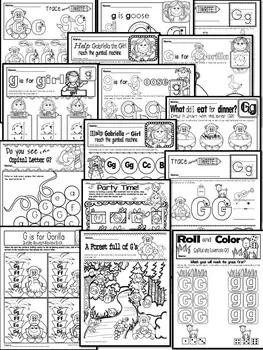
This is a HUGE packet of worksheets to teach, practice, and master the letter g. With over 90 pages, you will not run out of activities anytime soon. Marcelle’sKGZone has created this comprehensive letter g package , which includes playdough mats, tracing practice, art templates, center games, a Powerpoint, cards for a word wall, roll and write, foldable books, and much more!
Just print out what you need and your letter g lesson planning is done. Everything in this set is well done and kid-friendly. You are sure to find the tools for every student in this pack. And with everything included, you can use it everywhere you need it!
Worksheets are a great way to add practice to any letter curriculum. The letter g worksheets we’ve highlighted above are excellent resources and require little to no preparation, so they are easy for you and for your students.
Just choose the set that works best for your teaching style and preferences, print them, and you are ready. We aim to give you the tools you need to make teaching just a little bit easier and hope you found what you were looking for. Thanks for stopping by!

Home » Classroom Activities, Worksheets, & More » 10 Great Letter G Worksheets – Teaching Tools (2022)

Hi, I'm Amanda! Welcome to Education Outside! Im passionate about educating young minds and helping parents/teachers by providing easy and effective teaching resources. Check out all of my teaching resources on my Teachers Pay Teachers store .
Be the first to know
Subscribe to our newsletter and receive updates about new products, promotions, bundles, and more.

Copyright © Education Outside
Privacy Policy | Return Policy
Shop Worksheets
- Long Vowels
- Short Vowels
- Sight Words
Classroom Activities
- Alphabet Tracing
- Kindergarten Activities
- Number Tracing
- Long Vowel Practice
- Short Vowel Practice
- Sight Word Practice
- Fry Sight Word List
- Pre-primer Sight Word List
- Primer Sight Word List
- 1st Grade Sight Word List
- 2nd Grade Sight Word List
- 3rd Grade Sight Word List
- Amazon Books
- No products in the cart.
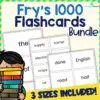
Grade Calculator
Use this calculator to find out the grade of a course based on weighted averages. This calculator accepts both numerical as well as letter grades. It also can calculate the grade needed for the remaining assignments in order to get a desired grade for an ongoing course.
Final Grade Calculator
Use this calculator to find out the grade needed on the final exam in order to get a desired grade in a course. It accepts letter grades, percentage grades, and other numerical inputs.
Related GPA Calculator
The calculators above use the following letter grades and their typical corresponding numerical equivalents based on grade points.
Brief history of different grading systems
In 1785, students at Yale were ranked based on "optimi" being the highest rank, followed by second optimi, inferiore (lower), and pejores (worse). At William and Mary, students were ranked as either No. 1, or No. 2, where No. 1 represented students that were first in their class, while No. 2 represented those who were "orderly, correct and attentive." Meanwhile at Harvard, students were graded based on a numerical system from 1-200 (except for math and philosophy where 1-100 was used). Later, shortly after 1883, Harvard used a system of "Classes" where students were either Class I, II, III, IV, or V, with V representing a failing grade. All of these examples show the subjective, arbitrary, and inconsistent nature with which different institutions graded their students, demonstrating the need for a more standardized, albeit equally arbitrary grading system.
In 1887, Mount Holyoke College became the first college to use letter grades similar to those commonly used today. The college used a grading scale with the letters A, B, C, D, and E, where E represented a failing grade. This grading system however, was far stricter than those commonly used today, with a failing grade being defined as anything below 75%. The college later re-defined their grading system, adding the letter F for a failing grade (still below 75%). This system of using a letter grading scale became increasingly popular within colleges and high schools, eventually leading to the letter grading systems typically used today. However, there is still significant variation regarding what may constitute an A, or whether a system uses plusses or minuses (i.e. A+ or B-), among other differences.
An alternative to the letter grading system
Letter grades provide an easy means to generalize a student's performance. They can be more effective than qualitative evaluations in situations where "right" or "wrong" answers can be easily quantified, such as an algebra exam, but alone may not provide a student with enough feedback in regards to an assessment like a written paper (which is much more subjective).
Although a written analysis of each individual student's work may be a more effective form of feedback, there exists the argument that students and parents are unlikely to read the feedback, and that teachers do not have the time to write such an analysis. There is precedence for this type of evaluation system however, in Saint Ann's School in New York City, an arts-oriented private school that does not have a letter grading system. Instead, teachers write anecdotal reports for each student. This method of evaluation focuses on promoting learning and improvement, rather than the pursuit of a certain letter grade in a course. For better or for worse however, these types of programs constitute a minority in the United States, and though the experience may be better for the student, most institutions still use a fairly standard letter grading system that students will have to adjust to. The time investment that this type of evaluation method requires of teachers/professors is likely not viable on university campuses with hundreds of students per course. As such, although there are other high schools such as Sanborn High School that approach grading in a more qualitative way, it remains to be seen whether such grading methods can be scalable. Until then, more generalized forms of grading like the letter grading system are unlikely to be entirely replaced. However, many educators already try to create an environment that limits the role that grades play in motivating students. One could argue that a combination of these two systems would likely be the most realistic, and effective way to provide a more standardized evaluation of students, while promoting learning.
letters homework
All Formats
Resource types, all resource types.
- Rating Count
- Price (Ascending)
- Price (Descending)
- Most Recent
Letters homework
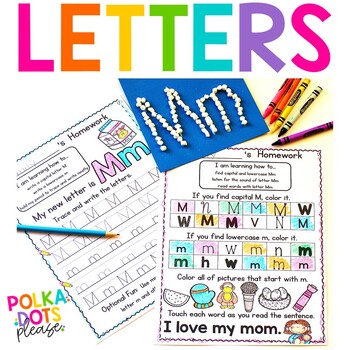
Letters Homework Worksheets & Alphabet Activities

Letter Sounds Fluency Practice Homework & Assessment Science of Reading BUNDLE

Homework Sorts & Lists | Letter Name Alphabetic Spellers | Words Their Way

Letter Naming Fluency Homework RTI for Kindergarten
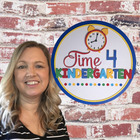
Alphabet Homework Pages for Kindergarten Letter Sounds

Alphabet Homework Pages - letters and sound phonics practice

Reading Log Homework Book Baggie and Family Parent Letter and Bookmarks!

Letter Sounds Fluency Practice Homework & Assessment Science of Reading Level A1
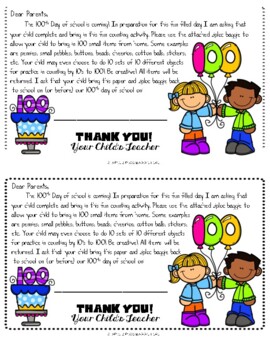
EDITABLE 100th Day of School Homework Project Letter

Sounds & Letters Homework BUNDLE {Bracelets with QR Codes}
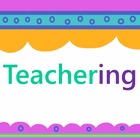
CVC Word Families - Word building, practice, homework , tests, and letter tiles

- Word Document File
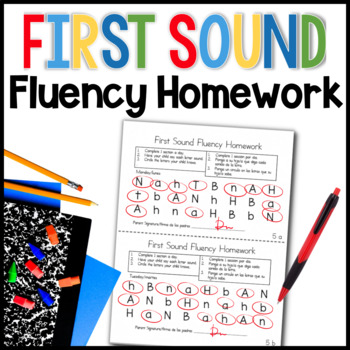
First Sound Letter Fluency Homework RTI for Kindergarten
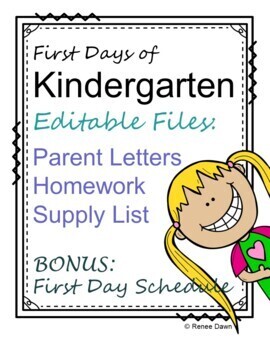
First Days of Kindergarten Homework and Letters to Parent – EDITABLE TEMPLATES

FREE Weekly Letter Writing Homework

Letter Identification - Assessment, Fluency, Printables, Homework , Bulletin Bd
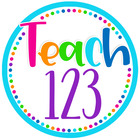
Editable Template & Printable | Back to School | Homework Parent Letters

FREE Alphabet Letter M Homework Worksheets and Activities
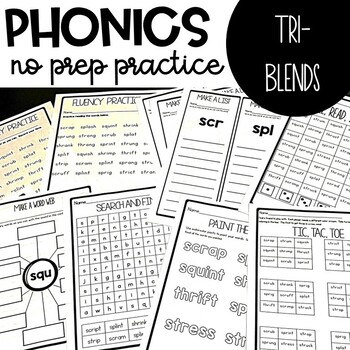
Three Letter Blends Worksheets Perfect for Centers or Homework

Letter Naming Fluency Homework Packet

Phonics Foundations Homework Practice - Lower-Case Letters

Why Do I Need to Practice My Speech Homework Parent Letter

Editable Newsletter Templates - Parent Letters - Parental Contact - Homework

Alphabet Letter Work {Morning Work- Homework -Practice Work}. DISTANCE LEARNING
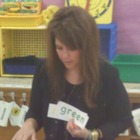
- We're hiring
- Help & FAQ
- Privacy policy
- Student privacy
- Terms of service
- Tell us what you think

The Homework Book
- View history
Transcript [ ]
DISCLAIMER : This is a transcript for a video of Michael performing the poem/book, not a transcript from the actual poem/book itself.
The homework book.
Miss Williams said that from now on, we would have homework. And that we were to bring a homework exercise book to school. This was... serious stuff. All about passing the exam. The exam called, the "eleven-plus". Everyone was worried about the eleven-plus. "Would I pass? Would I fail?" Everyone was worried; teachers, parents, us. I couldn't get to sleep. Mum brought me hot milk. On Mondays, Miss Williams went through the homework in our homework books. While she was talking, I got bored. I drew a picture in my homework book of a man with a big beard, right in the middle of my maths homework. He was carrying a bag. He put things, he picked up off the pavement into his bag. I called him, "Trev the Tramp".
Miss Williams went on going through the homework with the whole class. "This was really important. We had to listen or we wouldn't pass the eleven-plus." Everyone was listening. Everyone was concentrating, so that they could pass the eleven-plus. I bent down behind the boy sitting in front of me. I looked across to my friend Harrybo, and held up my picture of Trev the Tramp. I pointed at Trev the Tramp. I whispered, "Trev the Tramp". Miss Williams saw me holding up the homework book. She was onto it in a flash. "What's that boy? What is it?" I quickly shut the homework book. "Nothing, Miss Williams." She rushed over. She was brilliant at rushing over. She grabbed the homework book, she flicked through the pages, she found the picture of Trev the Tramp, right there in the middle of "23 times 12". "This is it, isn't it?!" she said. "In your homework book! I'll tell you what's going to happen now, boy." she said. "You're going to take your homework book, home to your parents, along with a letter from me." She pointed herself, when she said "me". "My goodness, you're in trouble, boy. Serious trouble."
For the rest of the day, I was very quiet. I put my feet down on the ground carefully, and I made sure I didn't bump into anything. At going hometime, she handed me a big white envelope. "The letter to your parents is in there, along with the homework book." But when I got home, I couldn't face giving it to my mum. I couldn't face giving it to my dad. I nipped upstairs, and slipped it under my bed. All evening, I was thinking about the big white envelope, with the letter from Miss Williams. The homework book and the picture of Trev the Tramp. I didn't want to give it to them. I didn't want to see their faces, as they read the letter and looked at Trev the Tramp. What I did, was put the big white envelope on their bed, when I went to bed. In the morning, my dad said: "Oh dear, you poor old thing. You must have been so worried about that letter, eh? I'll write one back. I'll say some things in the letter that will make sure you won't have to worry about this stuff anymore. I'll get you a-a new homework book."
At school, my friend said: "Did you get into trouble? Did you get the wax? What happened?" and I said: "My dad said I wasn't to worry." They didn't believe me, and I don't know what my dad wrote. But Miss Williams never said anything about it ever again. The head never said anything about it again. My dad was a teacher, and maybe he wrote in some kind of special teacher language. That meant Miss Williams wouldn't ever say anything again. Some kind of teacher code. Yeah, that's what must have done it.
- This is the first appearance of Miss Williams, as well as the last appearance of Harrybo in Michael's videos.

The Homework Book - POEM - Kids' Poems and Stories With Michael Rosen
- 2 Hand On The Bridge
- 3 No Breathing In Class (poem)

IMAGES
VIDEO
COMMENTS
Thank you. Dear Parent, It has been brought to our attention that your child has been missing homework. We are asking that you remind your child of the importance of homework. Please ensure it is being completed daily, as this greatly helps your child in the classroom. Thank you for your time and cooperation.
Homework Letter. Dear Parents / Carers, The children have made a fantastic start to the year and we are really happy they have settled so well. Thank-you for all your continued support with this transition. We know parents are always very keen to support their children at home and we hope this letter will be helpful in supporting you to do this.
The first month I send the reading logs home, I attach the "Reading at Home" two-page parent note. The parent letter has reading and comprehension strategies, strategies to help their child develop as a reader, tips for making a home reading nook, a list of ways to make reading an adventure, and a list of media they can read other than books!
Try starting with the most pressing homework. If you've got 20 math problems to do for tomorrow, and 20 pages to read in a novel for Friday, it's probably better to start with the math homework to make sure you'll have enough time to complete it. Make homework due the next day the priority. Try starting with the most important homework. Your ...
The individual approach -- the "no homework" letter -- is a difficult path that gets harder as children grow older. What really needs to happen is mass change and education of educators. For my next book, I'm digging into research that shows that there is no evidence that homework at the elementary school age helps at all. Many scholars dispute ...
Thanks to our slew of alphabet worksheets, new learners can explore their ABCs in a variety of formats at a variety of levels. Beginners can start with coloring and dot-to-dot alphabet worksheets before graduating to letter tracing, identifying missing letters, understanding vowels, and eventually, writing their first words.
Practice the letters from A to Z with this free printable alphabet book. Sit down with you child or your students and flip through the pages of this alphabet book, each page comes with letter ... These worksheets work well as letter of the week homework material too. Grab this freebie here - >My Printable Letters of the Alphabet Book. Other ...
Reinforce the home / school connection by sending books home with your students along with 5 EDITABLE reading logs for homework fun. ️ Includes an EDITABLE Family Parent Letter & 15 Bookmarks! ️ Includes 5 different editable reading logs in color and blackline. Make the log double sided if you choose. Enclose in a plastic baggie along with a book.
Send this letter home along with a child's guided reading book. The letter explains questions to ask the child and activities they can do with the book at home. Subjects: Reading, Reading Strategies. Grades: PreK - 1 st. Types: Homework, Guided Reading Books, For Parents. $1.00.
Description. Parent Letter explaining take home books and outlining process for at home reading homework. Reported resources will be reviewed by our team. Report this resource to let us know if this resource violates TPT's content guidelines.
Preschool Activities. Celebrate the letter of the week with these adorable, Free Alphabet Hats; We have lots of themed worksheets like these super cute Frozen preschool worksheets; Pirate Color by Number Preschool is a fun way to work on letter recognition while strengthening hand muscles; Color, Read and Learn your letters with this printable alphabet book pdf for each letter A to Z
Fine motor skills and reading uppercase and lowercase letters come together in dot-to-dot coloring pages and mazes. Versatile games throw numbers and shapes into the mix too! ... This book offers a concentration of vocabulary rich ABC pages, with plenty of pictures to color in that go along with a great big capital letter. It's an alphabet bonanza!
At the end of the year he will have a finished portfolio of his work. The Alphabet Notebook for Preschool and Kindergarten includes over 50 pages of printables. There is a cover page for your child to color and add his name. There are two pages per letter, one for the uppercase and one for the lowercase letters.
Recognizing and writing the letters in the alphabet is the foundation to become proficient readers and writers! Over 100 pages to help your students work on uppercase and lowercase letter formation while simultaneously learning letter names and letter sounds.These handwriting worksheets and mini books are perfect for your word work stations, literacy centers, morning work, or even alphabet ...
This comprehensive pack includes a range of teacher-made worksheets, games, and activities for every letter of the alphabet, from A all the way through to Z. Work through the entire alphabet with your students, using these worksheets as homework assignments or morning work. It's crucial that children learn the alphabet from an early age, so they can develop a love of language. This ...
This letter formation ABC home work handwriting sheet is a brilliantly versatile resource to have to hand when teaching children the core skills surrounding writing and learning the alphabet. You can use this practise page with children of various ages either in the classroom or as a homework task to do at home.
This file contains a letter to parents explaining book-in-a-bag homework. The file also contains possible activities for parents to complete with their students. In my kindergarten class, I have attached the letter to the front of a 6x9 manila envelope and the activities to the back. I then laminated the envelopes to protect them from wear.
First and foremost, the purpose behind writing letters is to build relationships and connect with my students. Every single week, I get to read a personalized note from my students, and they get to read one from me. I get to know them better, and they get to know me better, too. Second, it's an amazing way to have students practicing writing ...
This alphabet worksheet is a great way to check-in and make sure the child is grasping the beginning sounds of J words. They should color jeep, jar, jellyfish, jacket, jeans, jewely, and jump rope. I love making alphabet books for learning letter sounds! Have your child color the picture and finish tracing the simple sentences.
The activities include color and trace, mystery letter, sorting, a mini book, letter crown, and more! With 10 options, you can add the right worksheet right when you need it. Each kid-friendly page is attractive and fun. These are excellent for homework packets, sub plans, centers, group instruction, or wherever they fit into your letter g ...
Final Grade Calculator. Use this calculator to find out the grade needed on the final exam in order to get a desired grade in a course. It accepts letter grades, percentage grades, and other numerical inputs. The calculators above use the following letter grades and their typical corresponding numerical equivalents based on grade points.
Second Story Window. 4.8. (401) $26.00. $20.00. Bundle. This is 48 weeks of letter naming homework designed to help your students master the alphabet. Instead of just drill practice, these assignments actually teach letter name recognition. The 4 different levels allow you to differentiate based on students' needs.
The Homework Book is a poem by Michael Rosen from the book, Michael Rosen's Big Book of Bad Things. ... "You're going to take your homework book, home to your parents, along with a letter from me." She pointed herself, when she said "me". "My goodness, you're in trouble, boy. Serious trouble." For the rest of the day, I was very quiet. I put my ...